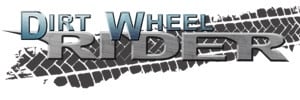Table of Contents
UTV s and ATVs are growing every year in popularity and many drivers would love to be able to drive theirs on state maintained highways. How cool would it be to just ride out to the trail from your house without having to load up or just ride down the road for a joyride. UTV s and ATVs from the factory are not legal to drive on state maintained highways or roads but with a few modifications, MOST states will allow you to enjoy the road from a legal standpoint.
UTV s and ATVs DO HOWEVER come with most of the necessary features to allow you to be street legal and they are all pretty easy to install so that your vehicle complies with local laws.
ATTENTION: Every state has different laws and this serves as a guide to making your UTV or ATV street legal. You should ALWAYS contact your local DMV to make sure you have EVERYTHING you need!
So you want to know how to make a UTV or ATV street legal? Making a UTV or ATV street legal usually takes a few modifications like installing a license plate, mirrors, turn signals , horn, and having insurance. Each state has different laws so check with your local DMV. If you are looking for a complete street legal kit that checks all the boxes you need, then check out these kits from Amazon:
If you are looking for information on how to turn your UTV into a street legal side by side or street legal quad, then check out the tips and guidance we provide below.
General Requirements To Become Street Legal
In the states that allow a UTV or ATV to become street legal there isn’t generally a lot that a UTV or ATV doesn’t offer in order to make this possible but you will need to make some additions to your vehicle to comply with most laws and they include:
- Rear View Mirror
- Side View Mirrors
- Rear Facing Tag Holder (With Light) & Tag
- A Horn Audible Up To 250 ft
- Front And Rear Turn Signals
- High And Low Beam Headlight
- Tail Light
- Brake Lights
- Rear Reflectors
- Mud Flaps
- Windshield Or Suitable Eye Protection
- Speedometer
If your UTV or ATV has some of these features then that is one less thing you will have to buy.
Street Legal Kits For UTV s and ATVs
Many companies sell street legal kits that come with all the different things you need for your four wheeler in one place so you don’t have to go searching everywhere for individual items. These kits are great because they come with the majority of what you need like turn signals, license plates, switches, and mirrors.
Other Requirements
If you live in one of the states that allows UTVs and ATVs to be street legal and your UTV or ATV is properly equipped, there are a few things you will need to take care of after your add on features. I can’t stress enough that this is dependent on your local laws.
- Your UTV or ATV needs to be able to pass the state safety inspection and possibly an emissions test as well.
- If you are driving on a state maintained highway then you will more often than not, need insurance for your 4-wheeler.
- Whoever is driving will need to have a valid driver’s license. Motorcycle endorsements shouldn’t be needed but should be something you verify with your local DMV first.
- You may not be allowed on all roads such as highways with high speed limits and highly populated areas. Again, check your local DMV!
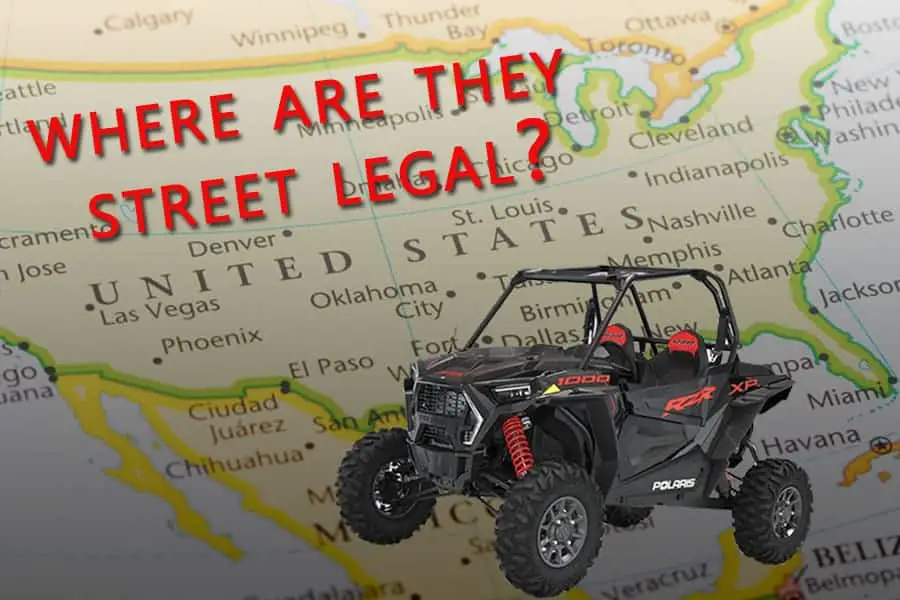
What Are The UTV or ATV Laws in Each State?
I have scoured every state law I could find to provide you with a detailed list of whether or not you can make a UTV or ATV street legal and what it takes to get you on the road. I have the websites for each state listed so please consult your state to save you a bunch of time and effort.
Note that each state may vary its terminology a bit – calling the machine a 4-wheeler, four wheeler, quad, Side-by-Side, UTV or ATV. So just read carefully but also use a little common sense. When in doubt, you can reach out to the government agency if you need clarification.
Alabama
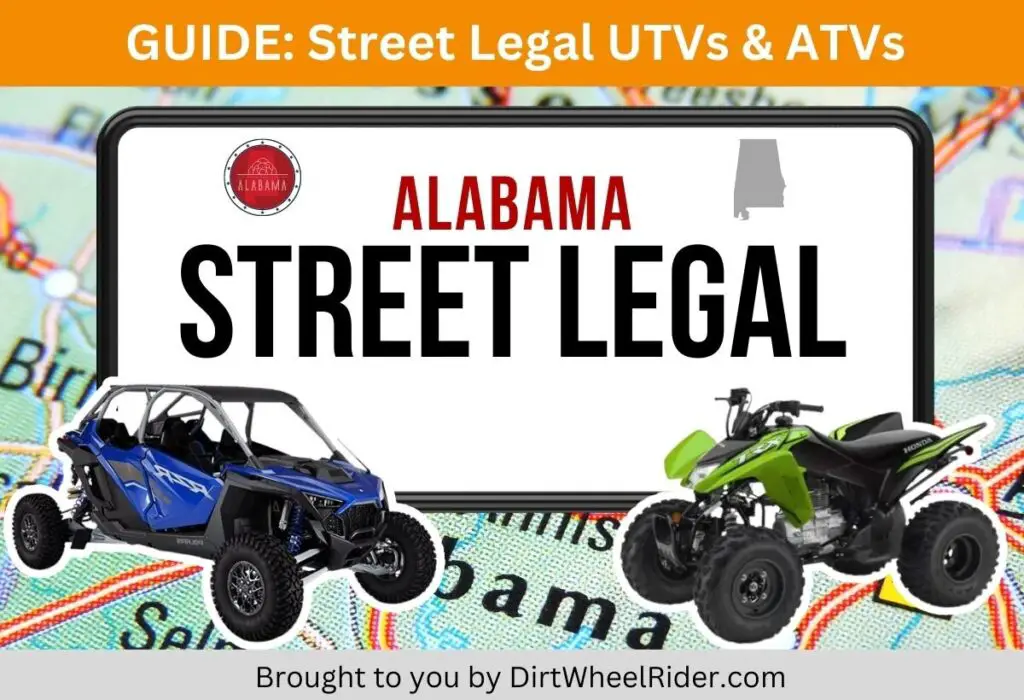 Summary:
Summary:
UTV s and ATVs are defined as off road vehicles and off road vehicles are not intended for use on public highways so they can not be registered in Alabama and can’t be street legal if not registered.
More details:
Understanding Street-Legal Laws for ATVs and UTVs in Alabama
Alaska
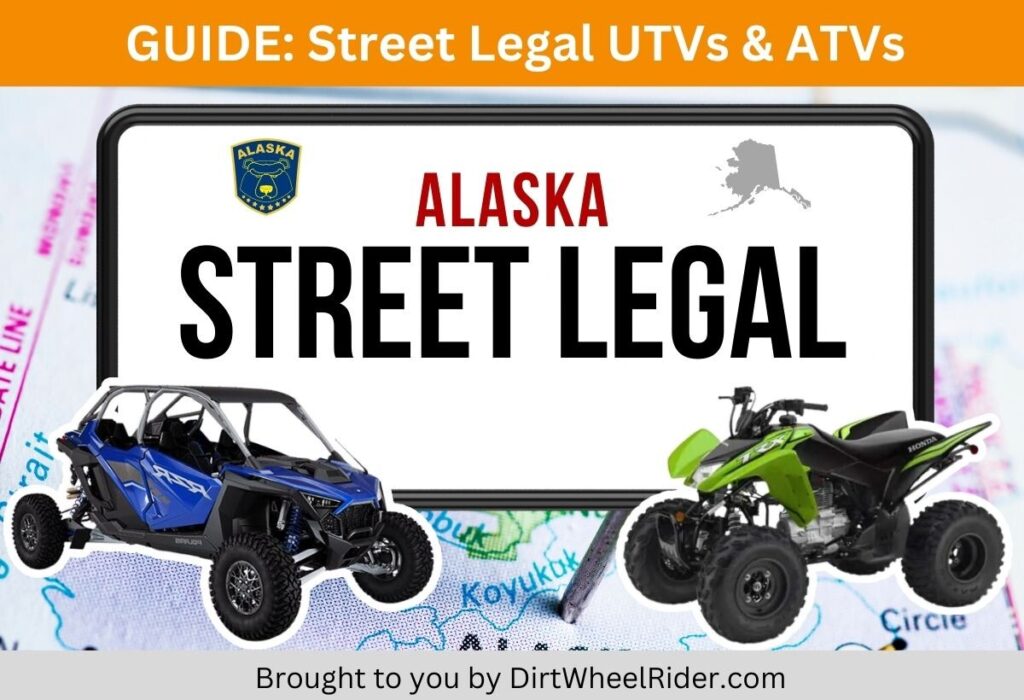 Summary:
Summary:
A UTV or ATV is an off highway vehicle by Alaska standards and is not held to the same laws as on road vehicles. They are ONLY allowed on the highway when:
- Snow or ice accumulation impedes access by normal vehicles.
- They are crossing the highway at approximately a right angle after coming to a complete stop first
- Traversing a bridge at the extreme right hand edge without interfering with other traffic on the highway.
Update: Starting January 1, 2022, ATVs and UTVs must be registered as all-purpose vehicles (APVs) if they are intended to be operated on public roads and highways in Alaska.
More details:
Understanding Street-Legal Laws for ATVs and UTVs in Alaska
Arizona
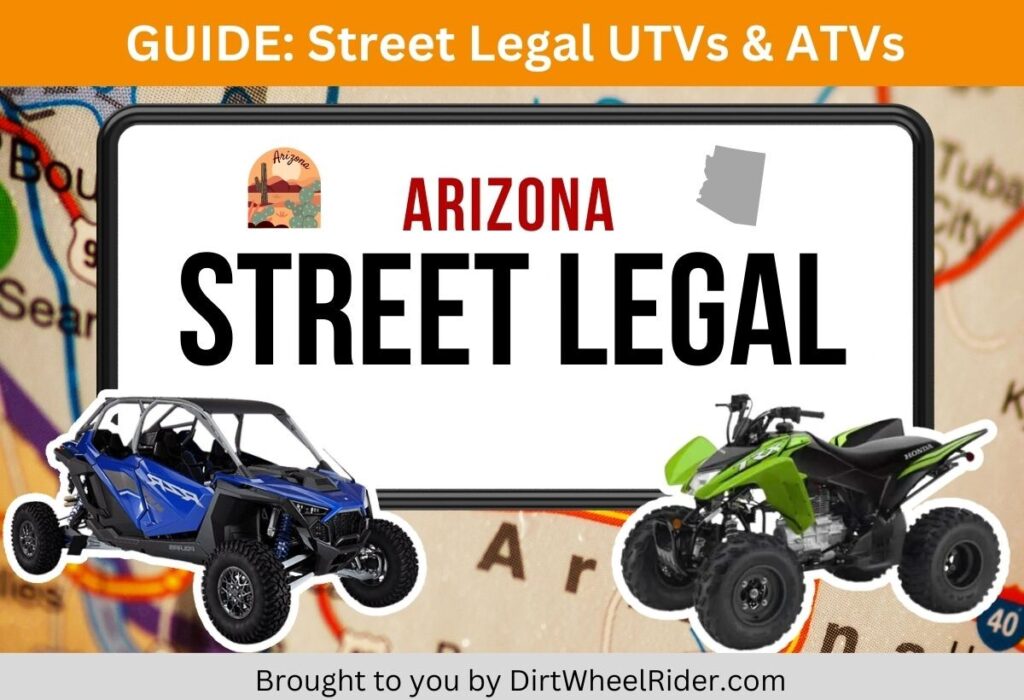 Summary:
Summary:
The state of Arizona requires an off highway vehicle decal to be purchased each year and is provided at the motor vehicle department, authorized 3rd party dealer, and online for added simplicity. To make your UTV or ATV legal to drive on highways, it has to be registered as if it were a regular vehicle. This includes:
- Getting an insurance policy
- Registering the UTV or ATV and paying all the attending fees
- Passing a safety inspection
- Passing an emissions safety test
- Getting a title for the UTV s and ATVs
More details:
Street-Legal ATVs & UTVs in Arizona
Arkansas
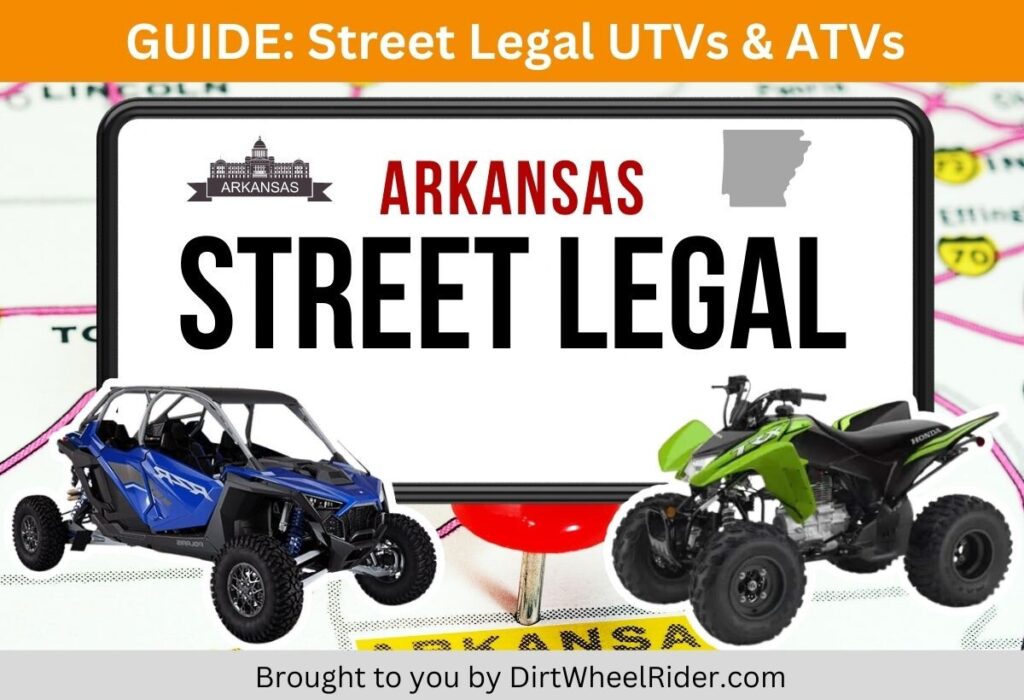 Summary:
Summary:
Arkansas off road vehicle law was amended in 2017 and states that an all terrain vehicle shall not be operated on a public street or highway of this state without meeting the equipment requirements to operate on public streets and highways. A street-legal all-terrain vehicle operated on a public street or highway of this state shall be equipped with:
- One or more headlights
- One or more tail lamps as required
- One or more stop lamps on the rear
- Hand or foot brakes
- A working horn
- A speedometer that illuminates for nighttime use
- Handholds and support for a passenger’s feet when designed to carry more than one person
- Seatbelts for each occupant if the street-legal all-terrain vehicle has side-by-side seating
- Tires that:
- Are not larger than the tires that the manufacturer made available for the street-legal all-terrain vehicle
- Have at least (2/32″) or greater tire tread
- A windshield; However, a windshield is not required if the operator of the street-legal all-terrain vehicle is wearing protective glasses, goggles, or a transparent face shield
- Rearview mirrors on the right and left side of the operator if the street-legal all-terrain vehicle is a utility task vehicle
- An operator of or passenger in a street-legal all-terrain vehicle is not required to use protective headgear.
More details:
Understanding Street-Legal Laws for ATVs and UTVs in Arkansas
California
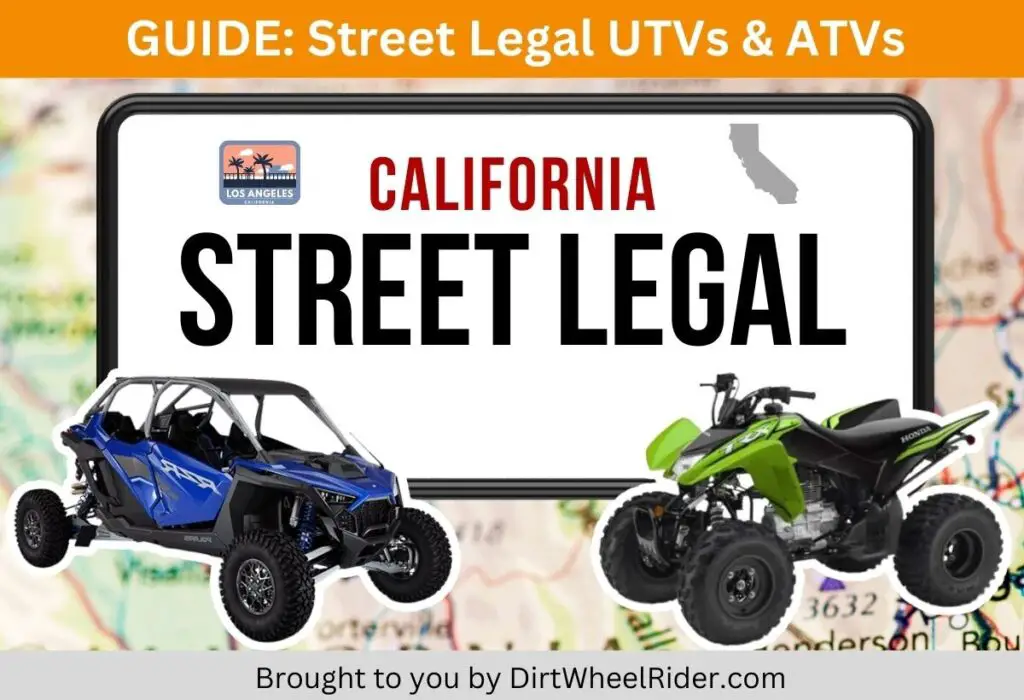 Summary:
Summary:
You can’t operate a UTV or ATV on the highway or any public roads and must have and off road vehicle identification sticker to be considered legal for off road. Riders must also have a safety helmet and cannot carry a passenger on public lands unless the vehicle is designed for more than one passenger.
More details:
Understanding Street-Legal Laws for ATVs and UTVs in California
Colorado
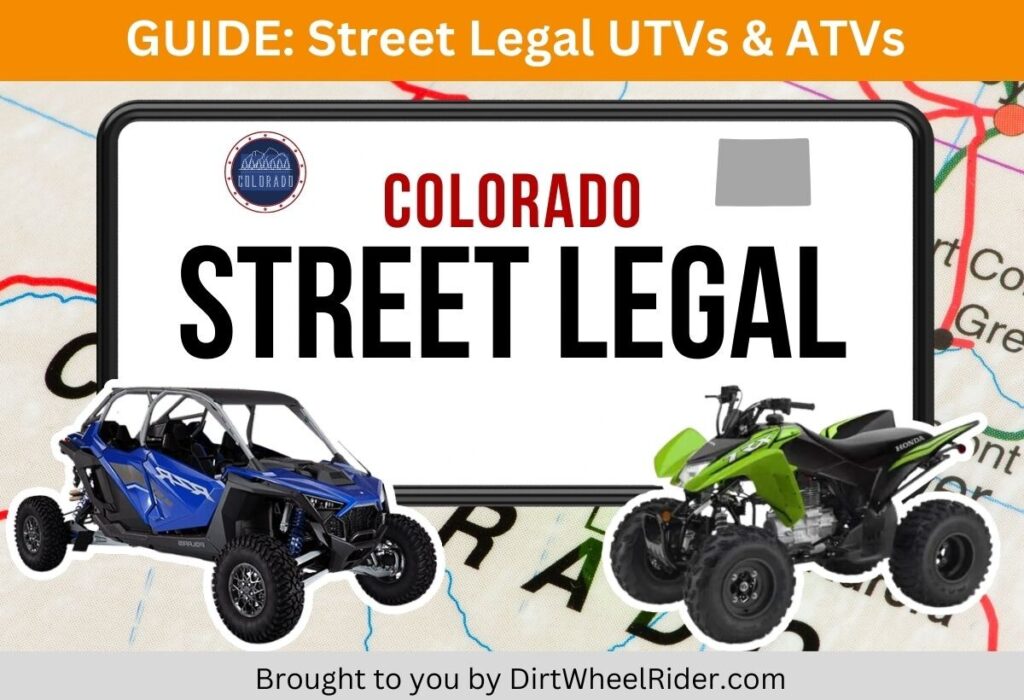 Summary:
Summary:
Colorado does not allow or recognize UTVs and ATVs as street legal. Instead, four wheelers are designated for most off road trails if they are designated as so. You must also register your UTV or ATV with the DMV and provide suitable proof of ownership. This includes:
- Certificate of Title
- Bill of Sale that includes both the seller and buyer’s printed names and signatures, the vessel/vehicle identification number (if any), the vehicle make, model and year (if known), and the date of the sale
- Previous registration certificate issued by a governmental entity
- Any court issued document proving ownership
- A physical inspection form completed by a CPW agent
More details:
Understanding Street-Legal Laws for ATVs and UTVs in Colorado
Connecticut
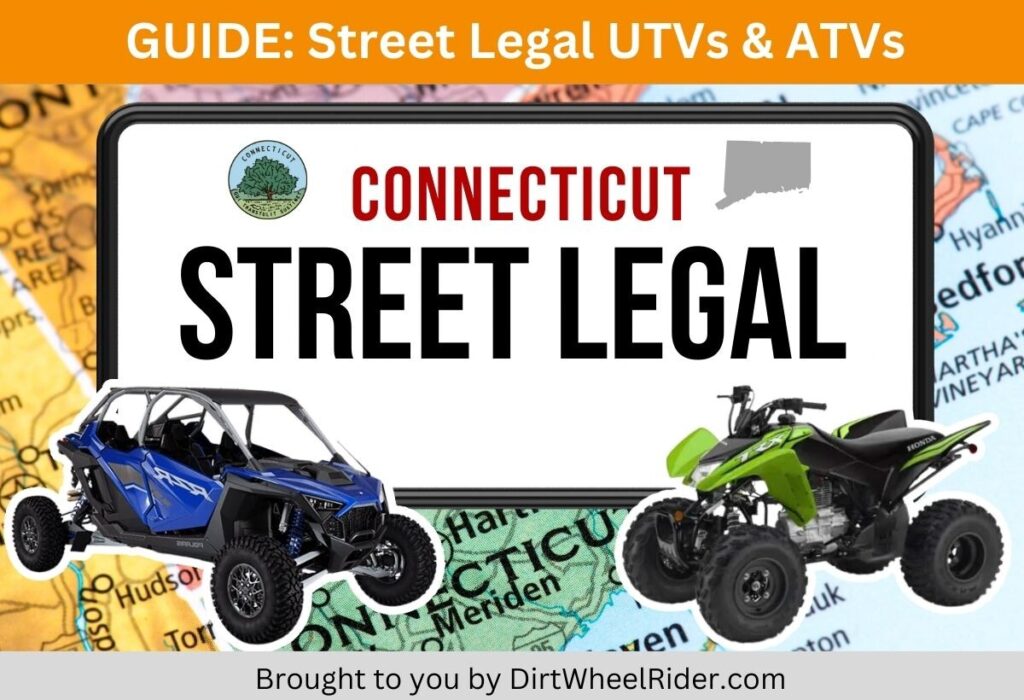 Summary:
Summary:
UTV s and ATVs may not operate on any public highway unless it is:
- Operated by a licensed motor vehicle operator and:
- May only cross a highway if the crossing is made at an approximately 90 degree angle
- At a location where no obstruction prevents a quick and safe crossing
- Comes to a complete stop before entering the traveled portion of the highway
- The driver yields the right-of-way to motor vehicles using the highway
More details:
Understanding Street-Legal Laws for ATVs and UTVs in Connecticut
Delaware
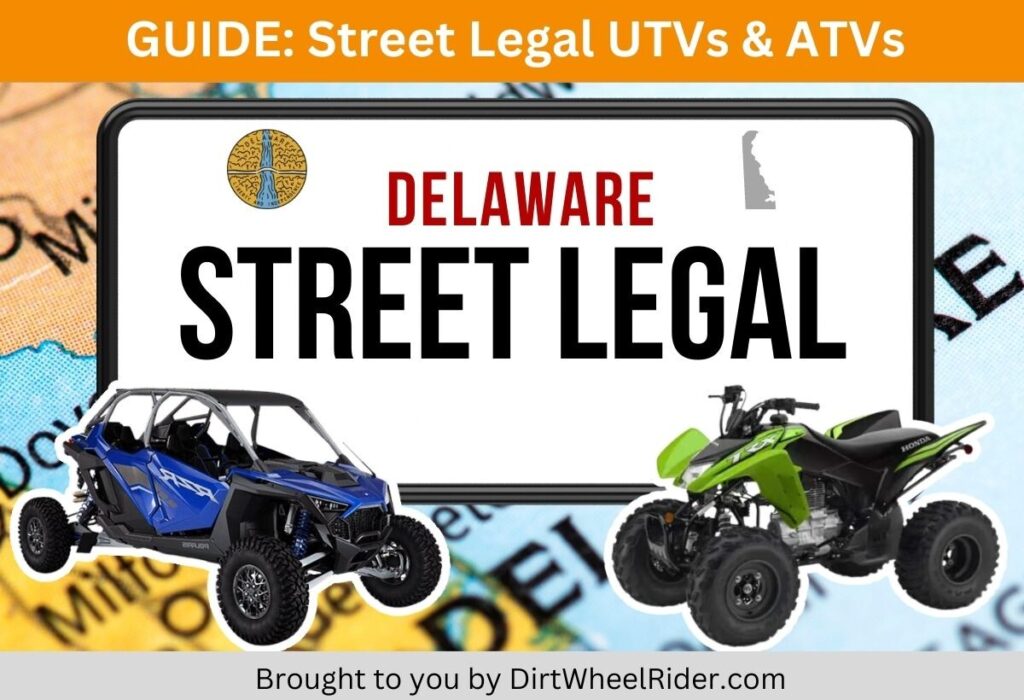 Summary:
Summary:
Delaware does not allow UTV s and ATVs to be street legal. They will not be operated upon a public highway, street, sidewalk, or right of way located within the state except under the following conditions:
- It is pushed across or along a public way as long as it is in neutral or that the power train is disengaged
- During a special event of limited duration, according to a prearranged schedule, only permitted from the governmental unit having jurisdiction
More details:
Understanding Street-Legal Laws for ATVs and UTVs in Delaware
Florida
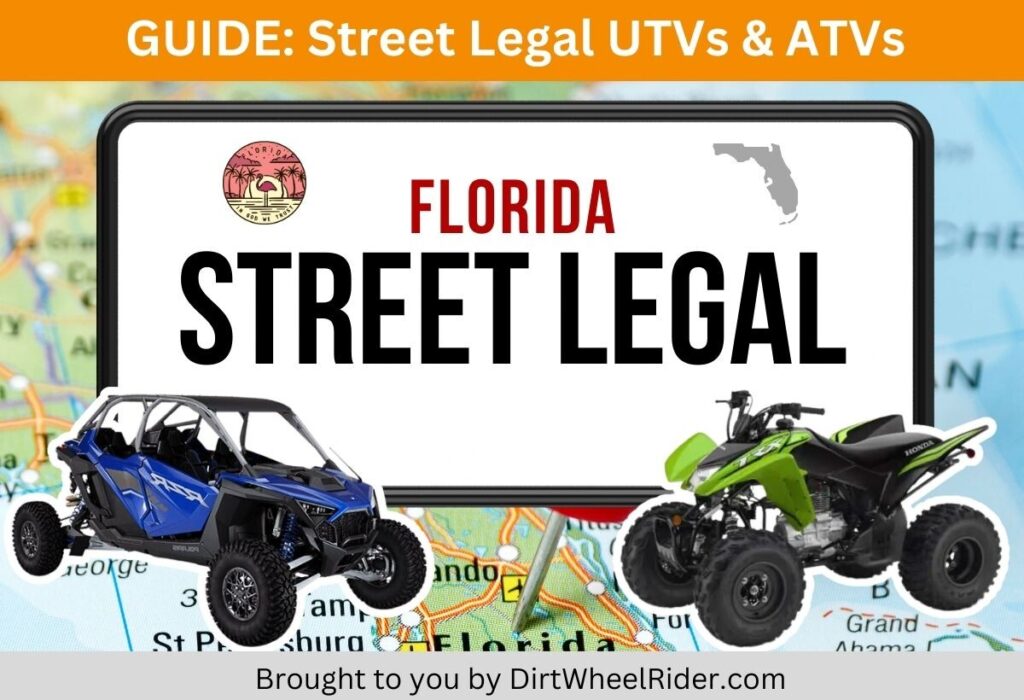 Summary:
Summary:
UTV s and ATVs can’t be operated on public roads, streets, or highways, unless permitted by the state or federal agency. Law enforcement officers can drive UTV s and ATVs on public roads as long as it is in the scope of their duty.
More details:
Understanding Street-Legal Laws for ATVs and UTVs in Florida
Georgia
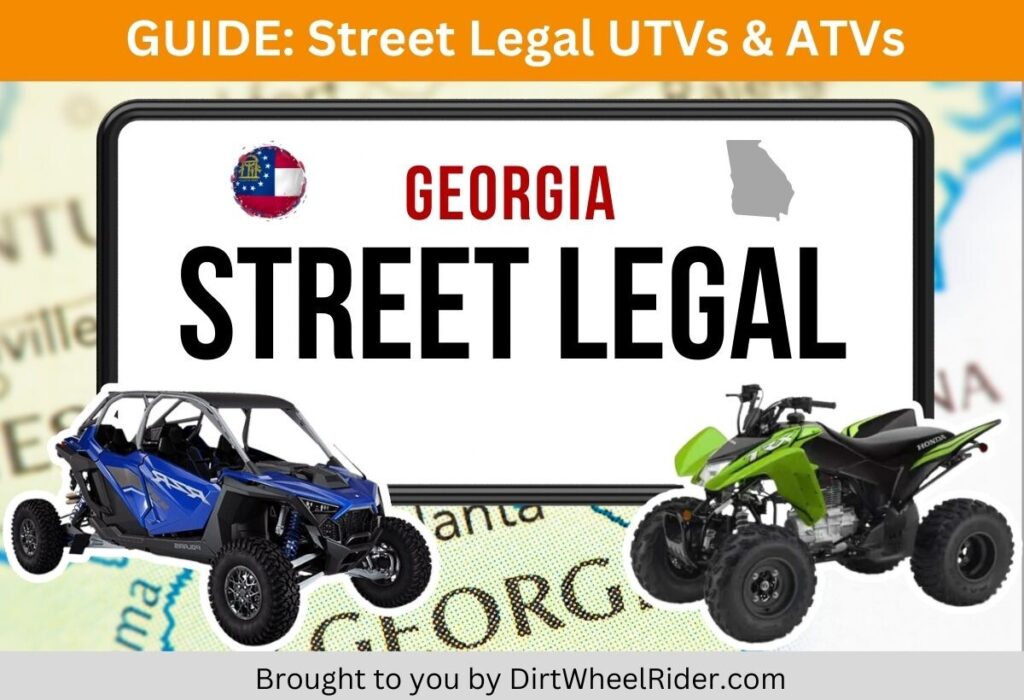 Summary:
Summary:
While I can’t find any law that specifically states that you can’t operate a UTV or ATV on public highways, the general consensus is no. The law only states you must:
- Have operative brakes and muffler or other silencing equipment
- Get express written permission to drive on any private property
- Not operate within any perennial stream unless crossing it
More details:
Understanding Street-Legal Laws for ATVs and UTVs in Georgia
Hawaii
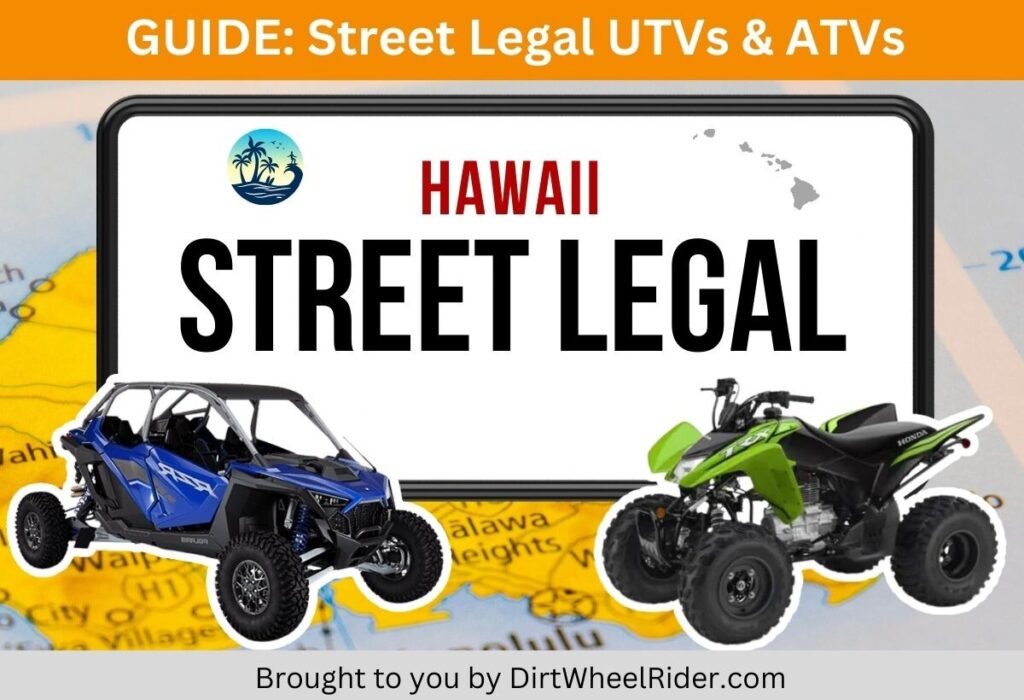 Summary:
Summary:
Hawaii only allows UTV s and ATVs used as farm equipment or in the course of official city, county, or state business to be driven on a street if certain conditions are met. The law also states that UTV s and ATVs used as farm equipment or in the course of official city, county, or state business shall not be regulated as motor vehicles.
More details:
Understanding Street-Legal Laws for ATVs and UTVs in Hawaii
Idaho
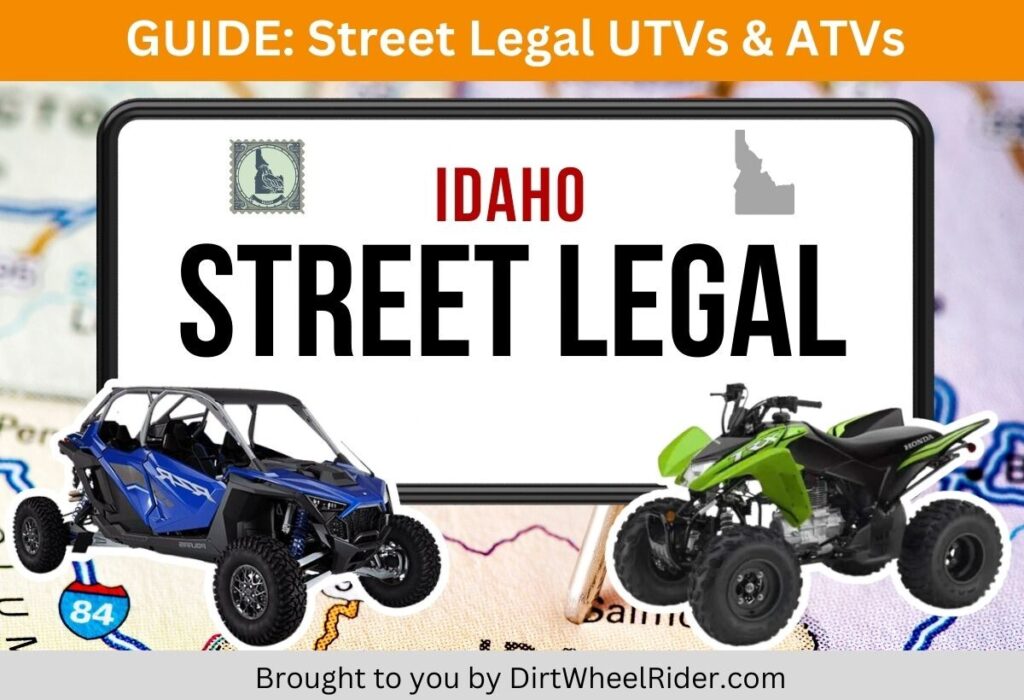
Summary:
UTV s and ATVs are now allowed on all state or federal roads, excluding state and federal highways and interstates as long as the quad has a restricted use plate and current year OHV sticker. Designated OHV riding areas, areas open to cross-country motorized travel and designated motorized trail systems on public land will require both the restricted use plate and the OHV sticker.
When traveling on roads, operators of an UTV or ATV must have a valid driver’s license, carry liability insurance and have a vehicle equipped with the required equipment to do so.
More details:
Street-Legal ATVs & UTVs in Idaho
Illinois
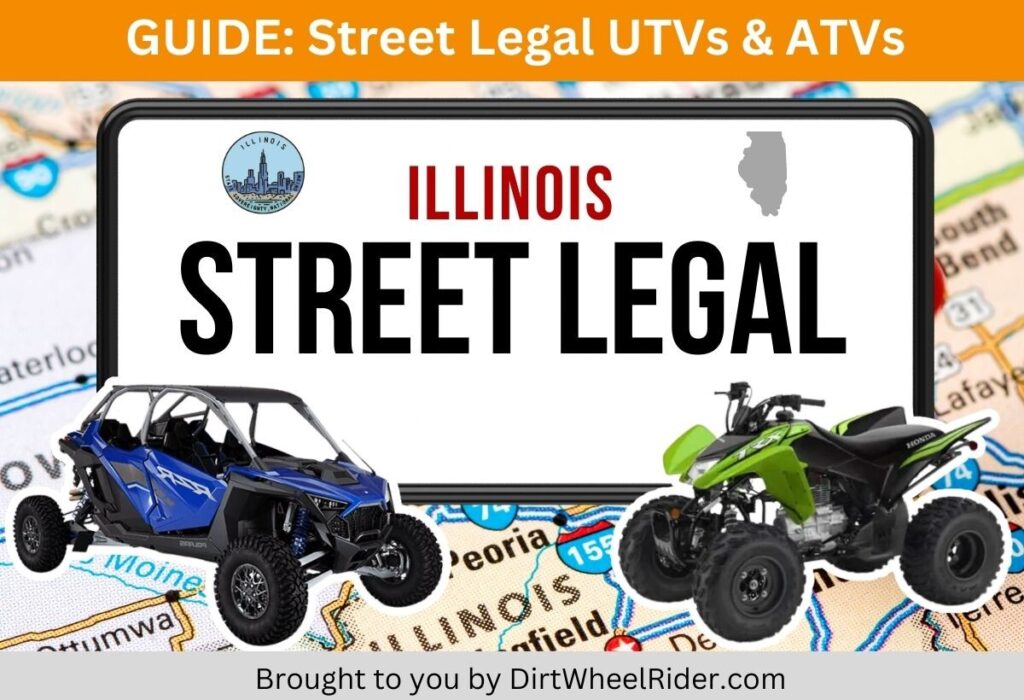
Summary:
You must title your UTV or ATV for operation off road and UTV s and ATVs are not permitted on public streets, roads, or highways unless you are crossing and you must:
- Cross at approximately 90 degrees to the road
- Come to a complete stop
- Yield to right of way traffic
- Only cross at an intersection if crossing a divided highway
More details:
Street-Legal ATVs & UTVs in Illinois
Indiana
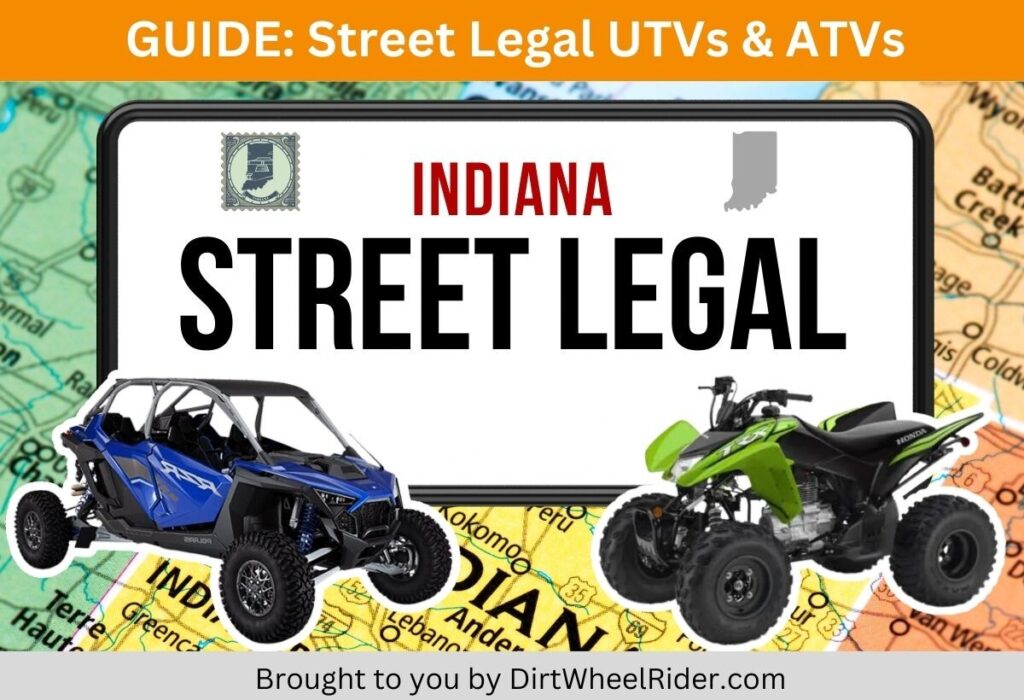
Summary:
UTV s and ATVs must be titled and registered with the Bureau of Motor Vehicles for off road use.
More details:
Understanding Street-Legal Laws for ATVs and UTVs in Indiana
Iowa
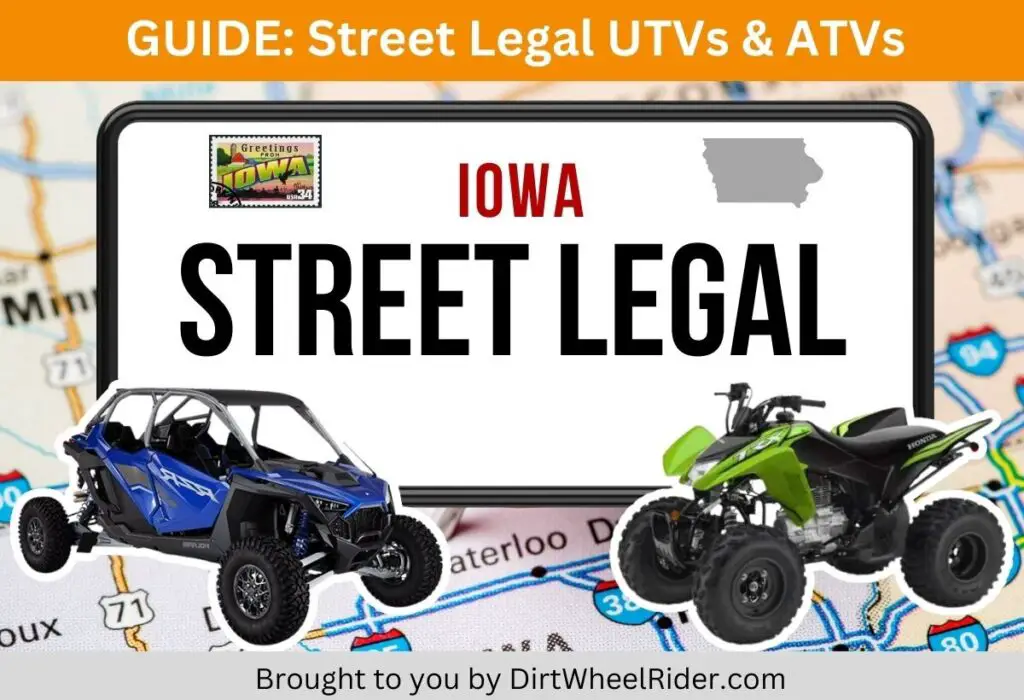
Summary:
Iowa is also a county by county basis state but for those counties that do not allow you to drive a UTV or ATV on the street you must:
- Cross at approximately 90 degrees to the road
- Come to a complete stop
- Yield to right of way traffic
- Only cross at an intersection if crossing a divided highway
More details:
Understanding Street-Legal Laws for ATVs and UTVs in Iowa
Kansas
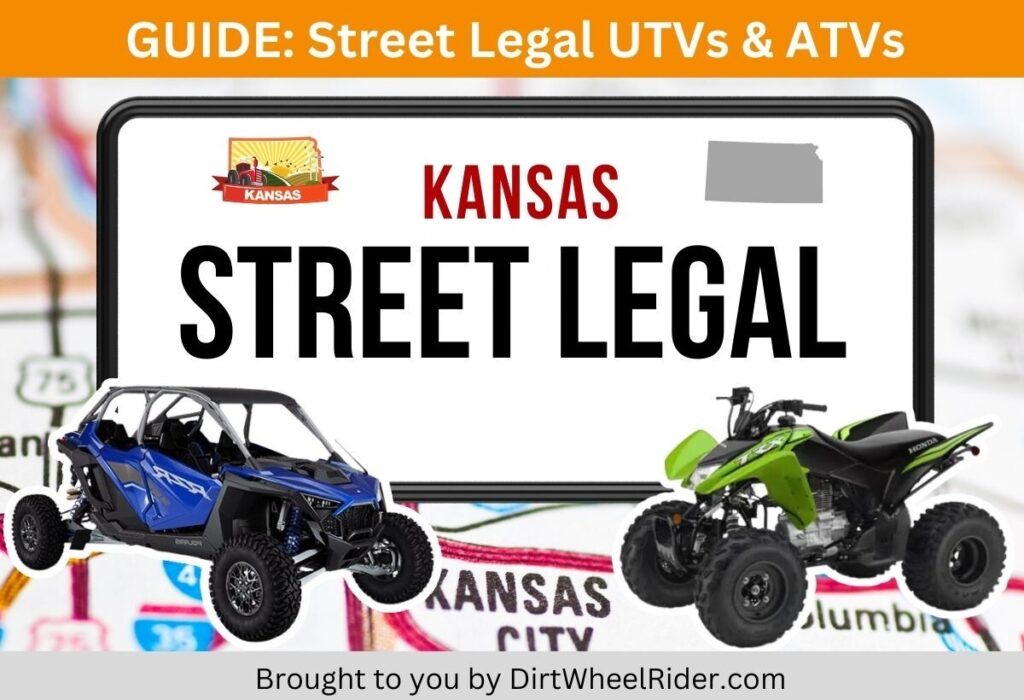
Summary:
Kansas does not permit UTV s and ATVs on public roads and highways or inside city limits but they still must be registered and have to have lights on it if you want to ride during dark hours.
More details:
Understanding Street-Legal Laws for ATVs and UTVs in Kansas
Kentucky
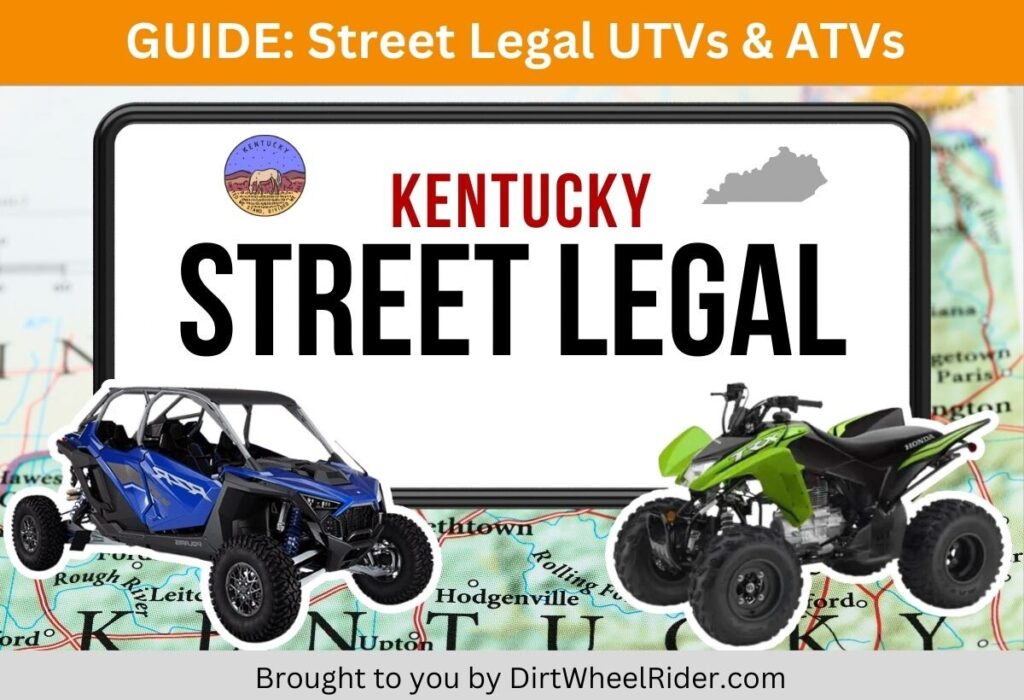
Summary:
A four wheeler (UTV or ATV) cannot be operated on any public highway, roadway or the right-of-way of any public highway or roadway. The only exceptions are to:
- Cross at approximately 90 degrees to the road
- Come to a complete stop
- Yield to right of way traffic
- Only cross at an intersection if crossing a divided highway
- Can only be operated on a 2 lane public highway if the operator is engaged in farm or agriculture related activities, construction, road maintenance, or snow removal. These operators must be licensed.
More details:
Understanding Street-Legal Laws for ATVs and UTVs in Kentucky
Louisiana
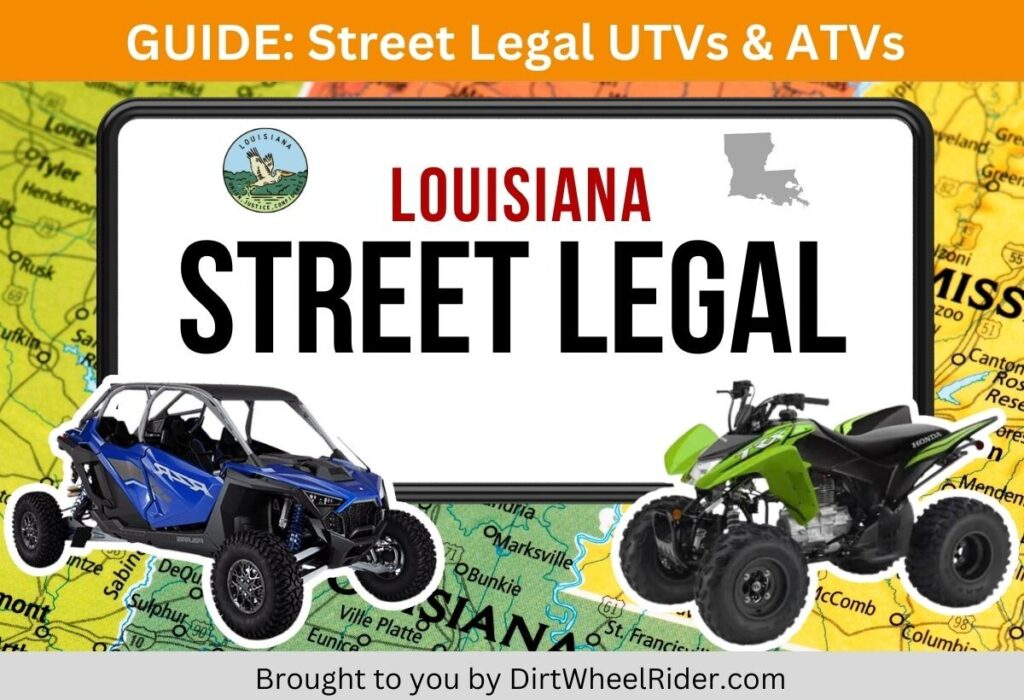
Summary:
An off-road vehicle is any vehicle manufactured for off-road use. The vehicle is issued a manufacturer’s statement of origin but cannot be issued a license plate to operate on the public roads of this state.
More details:
Understanding Street-Legal Laws for ATVs and UTVs in Louisiana
Maine
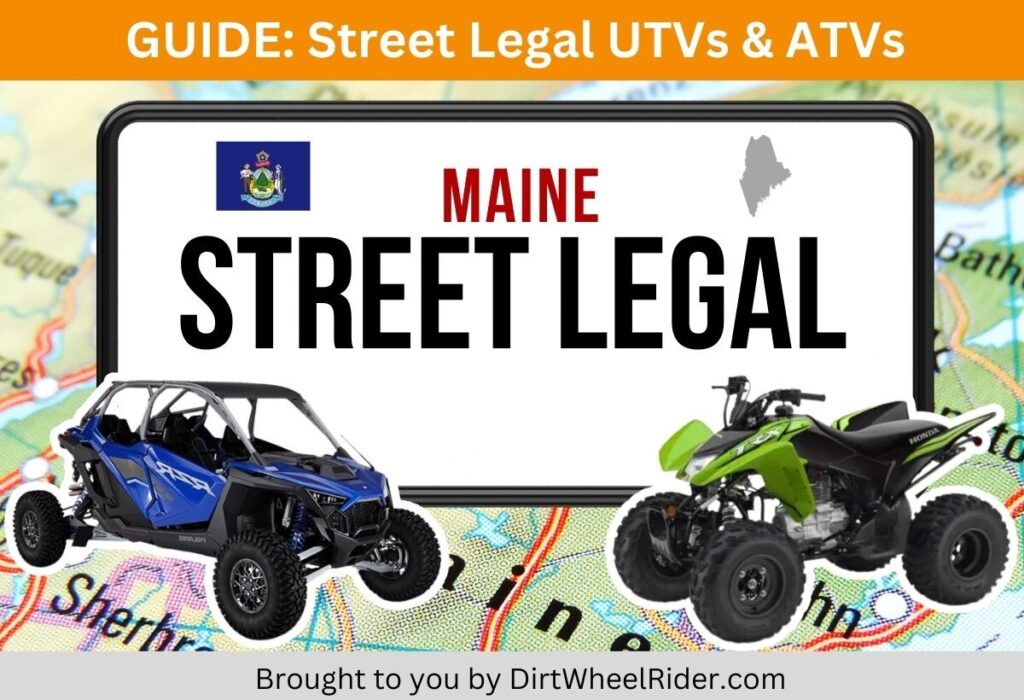
Summary:
You cannot operate a UTV or ATV on public roads, streets, or highways. A properly registered ATV may be operated on a public way only the distance necessary, but in no case to exceed 500 yards, on the extreme right of the traveled way for the purpose of crossing, as directly as possible, a public way, bridge, overpass, underpass, sidewalk or culvert as long as that operation can be made safely and does not interfere with traffic approaching from either direction on the public way.
More details:
Understanding Street-Legal Laws for ATVs and UTVs in Maine
Maryland
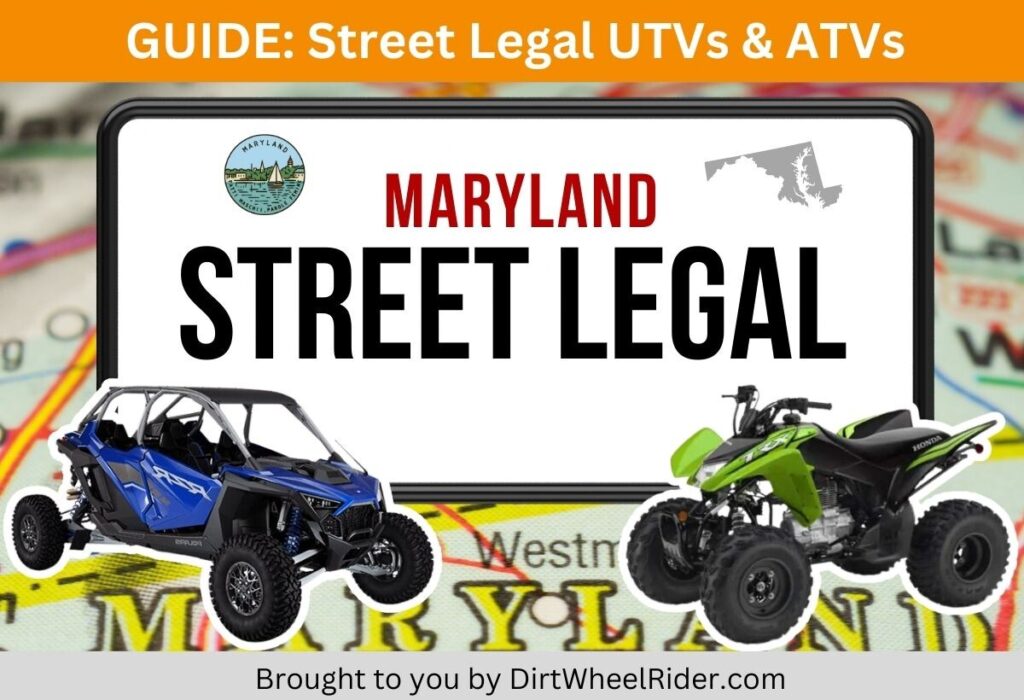
Summary:
UTV s and ATVs are not permitted to be operated on public roads except for agricultural purposes and are not required to be registered if it is on your own property. Crossing public roads and highways applies the same as other states.
More details:
Understanding Street-Legal Laws for ATVs and UTVs in Maryland
Massachusetts
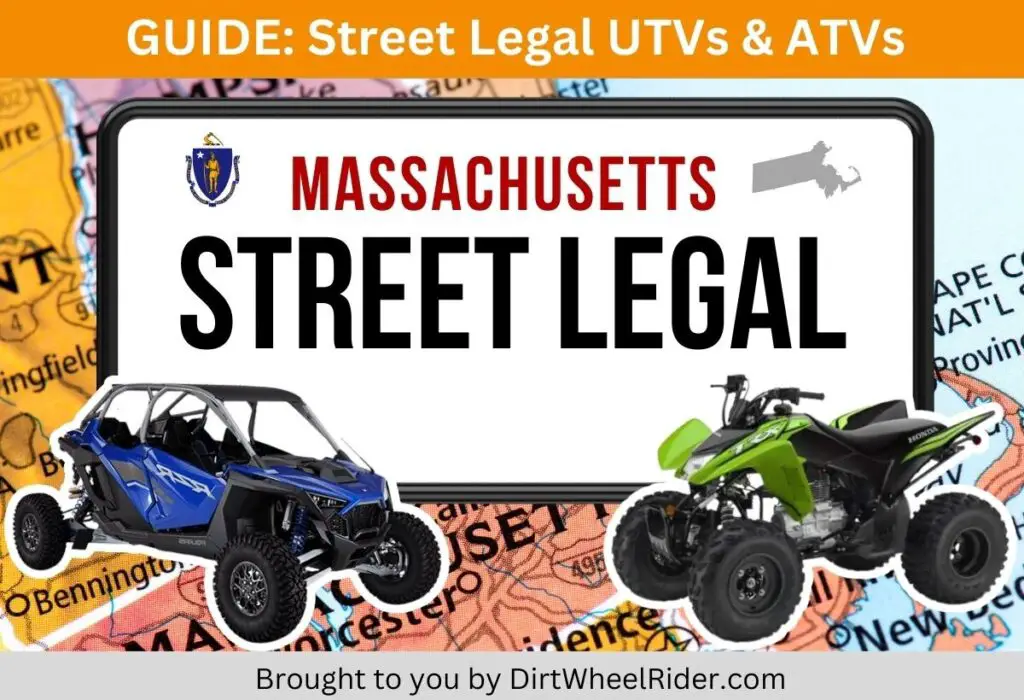
Summary:
UTV s and ATVs must be registered and can’t be operated on public roads, streets, and highways except for crossing the road.
- Cross at approximately 90 degrees to the road
- Come to a complete stop
- Yield to right of way traffic
- Only cross at an intersection if crossing a divided highway
- 4-wheelers can only be operated on a 2 lane public highway if the operator is engaged in farm or agriculture related activities
18 year olds and younger must have completed a MEP approved OHV Safety & Responsibility course.
Michigan
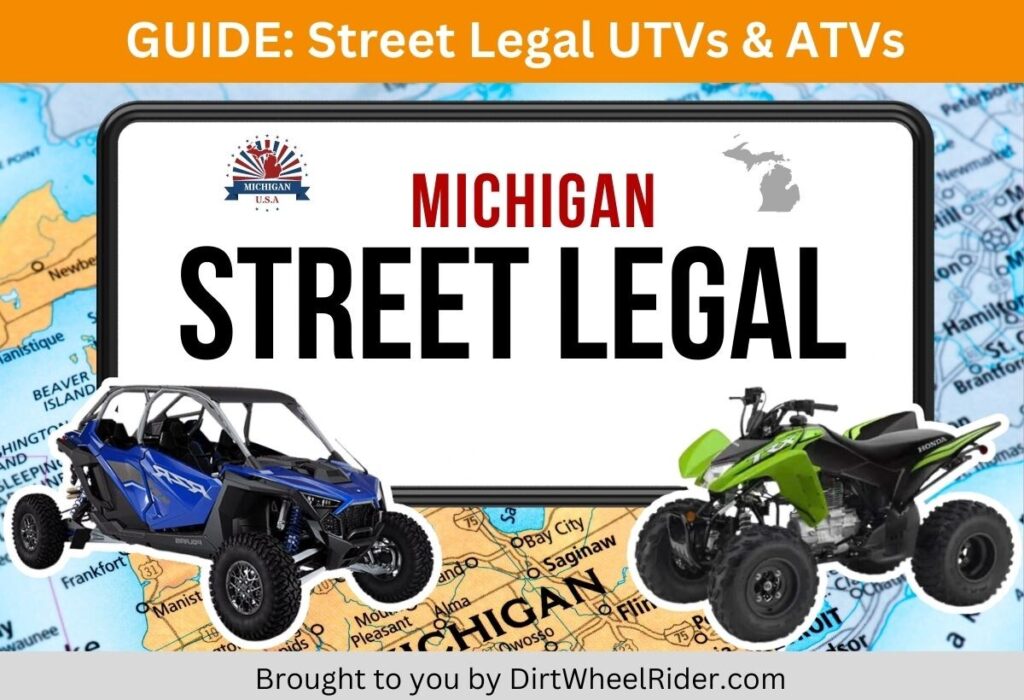
Summary:
You have to have a decal to use your UTV or ATV on public lands and they are not permitted on public roads, streets, and highways. Crossing these is the same as previous states.
Only certain UTV s and ATVs like the John Deere Gator and Polaris Ranger can be street legal but needs to be retrofitted and retitled. It will be retitled as an “assembled vehicle” and issued a new vehicle identification number.
More details:
Understanding Street-Legal Laws for ATVs and UTVs in Michigan
Minnesota
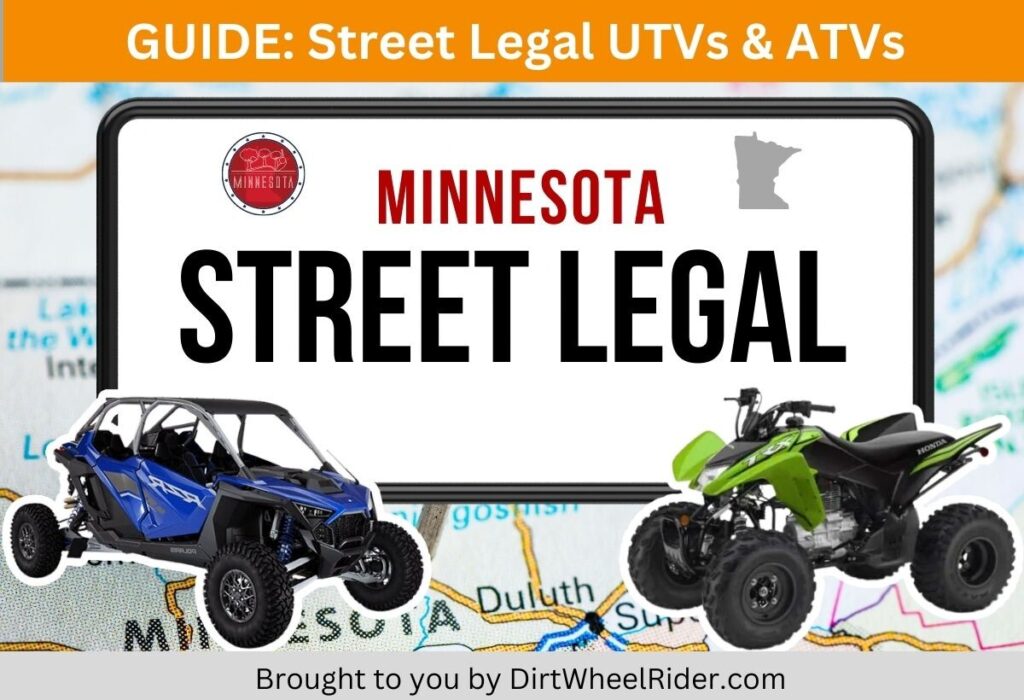
Summary:
UTV s and ATVs may be operated on the shoulder of public roads if permitted by law enforcement and are not permitted to be used on public roads and highways.
More details:
Understanding Street-Legal Laws for ATVs and UTVs in Minnesota
Mississippi
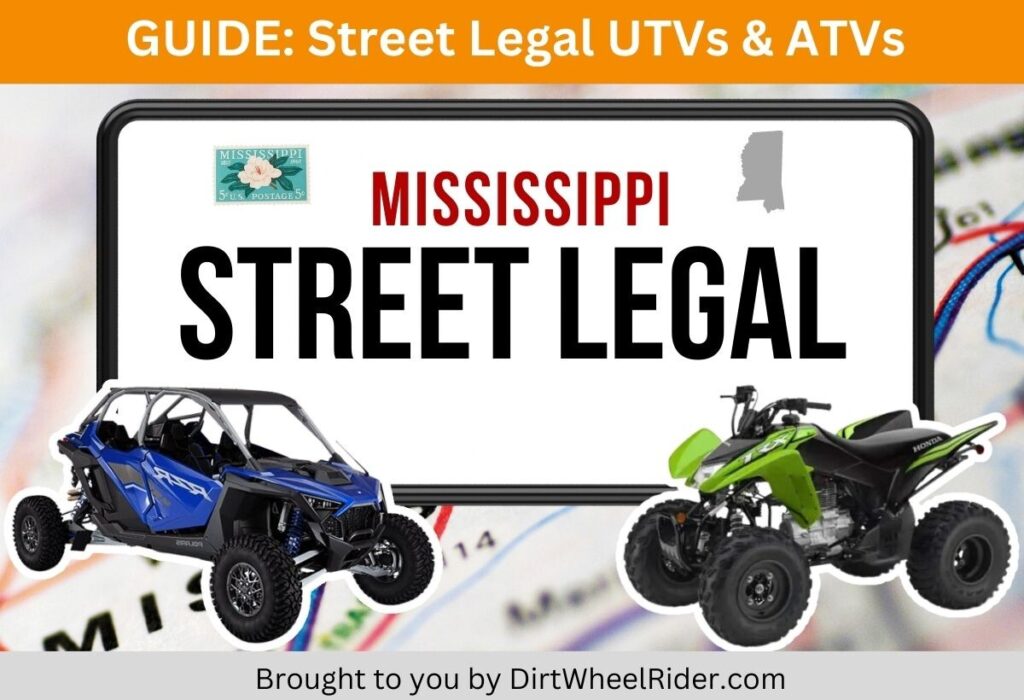
Summary:
No ATV/ORV allowed on any public road open to licensed motorized vehicles or on power line/pipeline rights-of-ways. No stipulations are given about crossing highways or roads.
More details:
Understanding Street-Legal Laws for ATVs and UTVs in Mississippi
Missouri
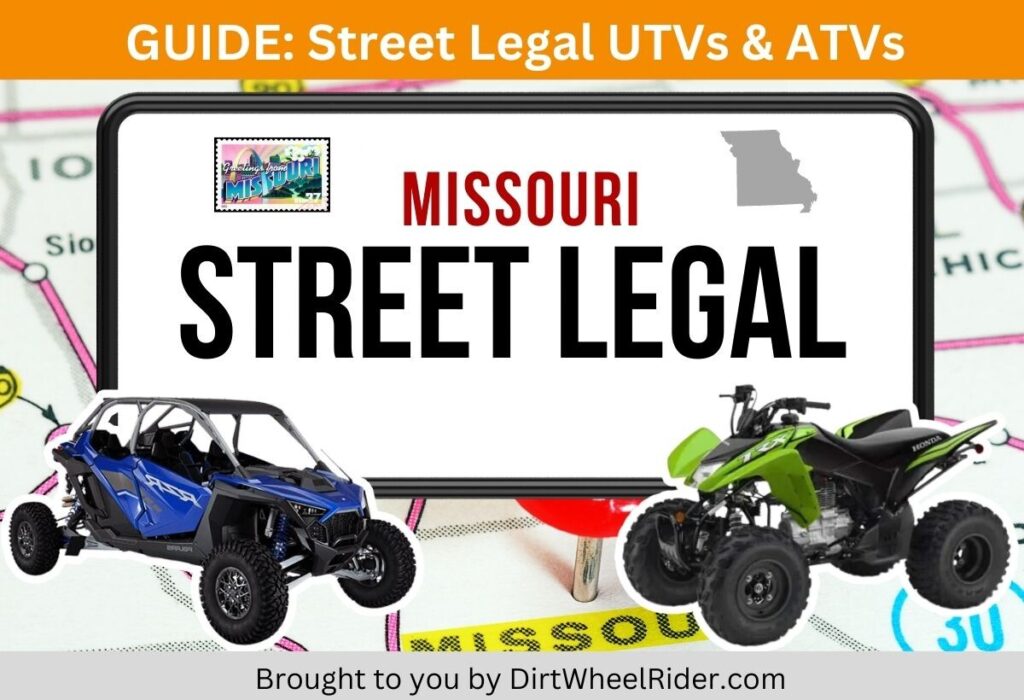
Summary:
UTV s and ATVs cannot be used on the highway and require a title and registration. They can be used on public roads for agricultural and official government use only. They may be operated by handicapped persons on secondary roads occasionally.
More details:
Understanding Street-Legal Laws for ATVs and UTVs in Missouri
Montana
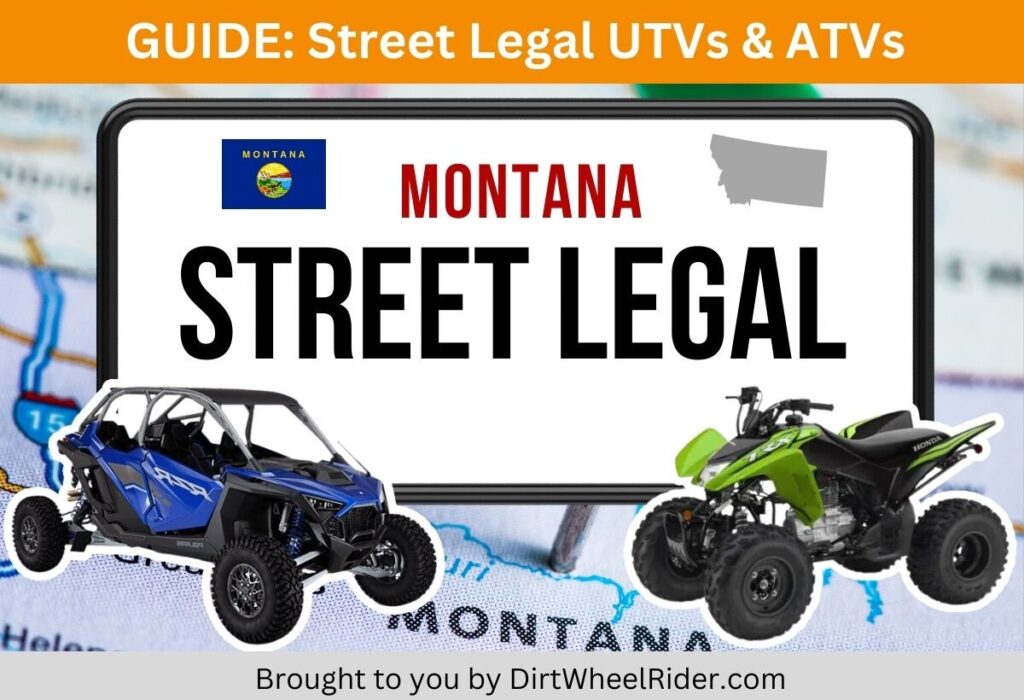
Summary:
Montana requires registration and UTV s and ATVs can be used on some public roads. You can’t use them on the interstate or federal highways. Montana is mostly county by county basis.
More details:
Street-Legal ATVs & UTVs in Montana
Nebraska
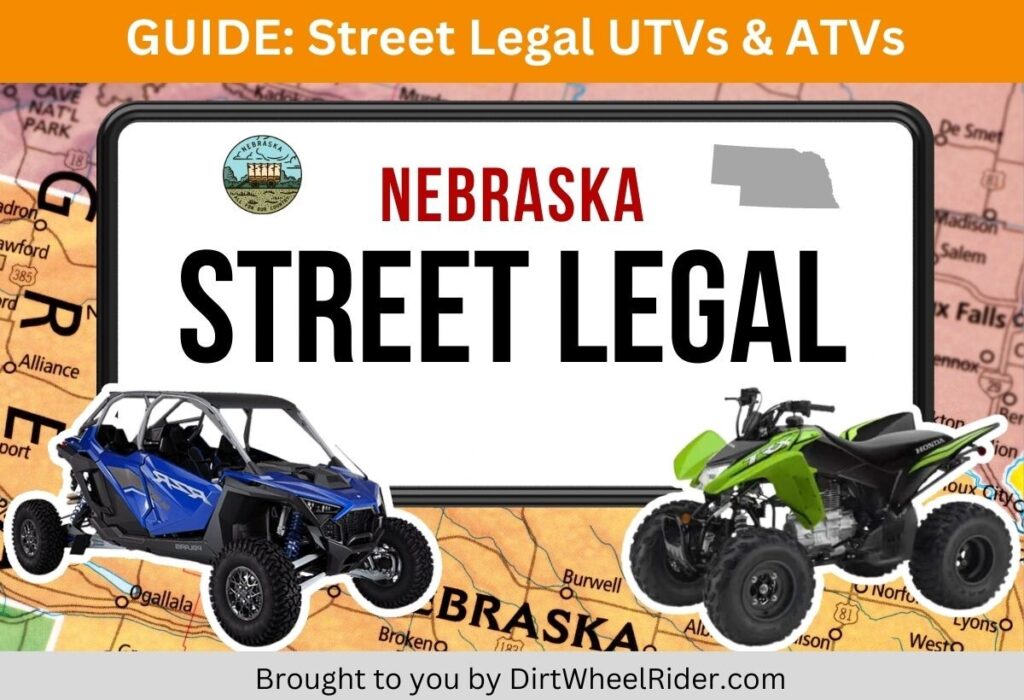
Summary:
UTV s and ATVs can be driven for agricultural use only on the shoulders of roads that are outside of an incorporated area and are not controlled access highways.
When driving on a road you can’t exceed 30 mph and must have a valid driver’s license, and need a headlight, taillight, and a safety flag that is 5 feet or more above the ground and triangular in shape.
More details:
Understanding Street-Legal Laws for ATVs and UTVs in Nebraska
Nevada
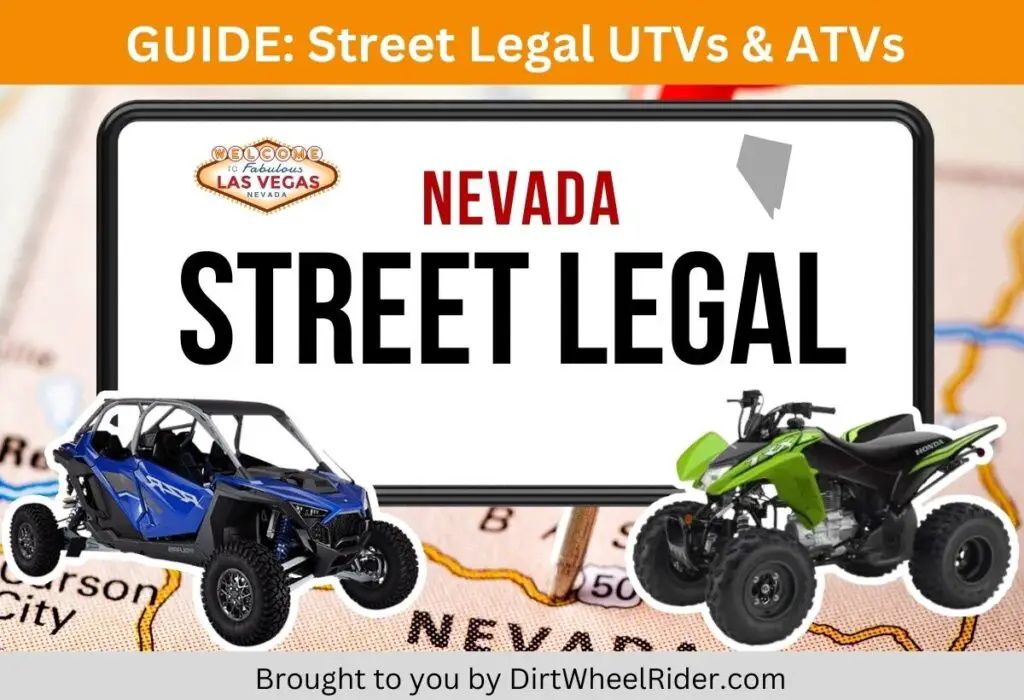
Summary:
If a vehicle was manufactured and designated for “off-road” or “non-road” use only, it may not be driven on Nevada public streets or highways even if it has safety equipment. Only two-wheeled motorcycles may be converted to on-road use.
More details:
Understanding Street-Legal Laws for ATVs and UTVs in Nevada
New Hampshire
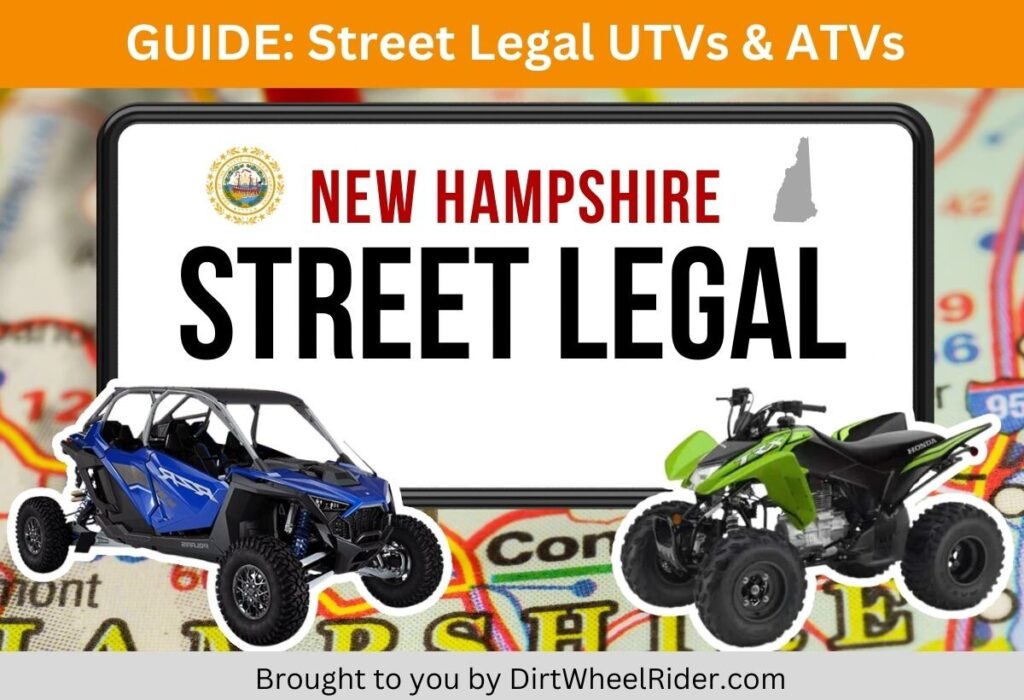
Summary:
Operation is prohibited on public roads unless specifically permitted and posted for OHRV or snowmobile use. Examples of permitted uses are road crossings and trail connectors. In such areas the speed limit is 10 MPH, unless otherwise posted. OHRVs and snowmobiles must stay to the extreme right side of the public way; they cannot operate from trail head to trail head.
More details:
Understanding Street-Legal Laws for ATVs and UTVs in New Hampshire
New Jersey
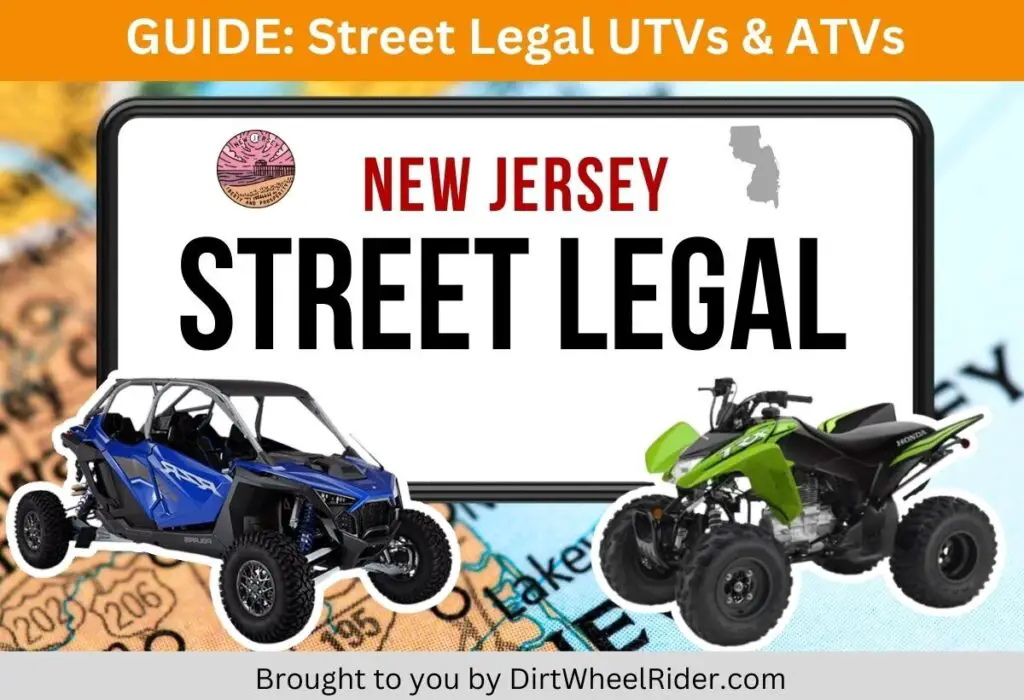
Summary:
You do not need a permit or license to operate an all-terrain vehicle (ATV) in New Jersey. However, the vehicle must be registered and you must observe the following regulations:
- Operator must be at least 14 years old.
- Always carry proof of liability insurance and current registration.
- Use the ATV/UTV or ATV or dirt bike for off-road use only.
- If you are under 18 years old, you must enroll in the ATV Safety Institute course to operate an ATV/UTV or ATV
- Anyone under age 16 is prohibited from operating an ATV or dirt bike with an engine capacity greater than 90 ccs during training or while on public lands or waters or to cross a public roadway.
- Individuals cannot sell more powerful ATVs or dirt bikes to anyone under 16 years of age.
- ATV use is prohibited in all New Jersey State Parks and Forests
More details:
Understanding Street-Legal Laws for ATVs and UTVs in New Jersey
New Mexico
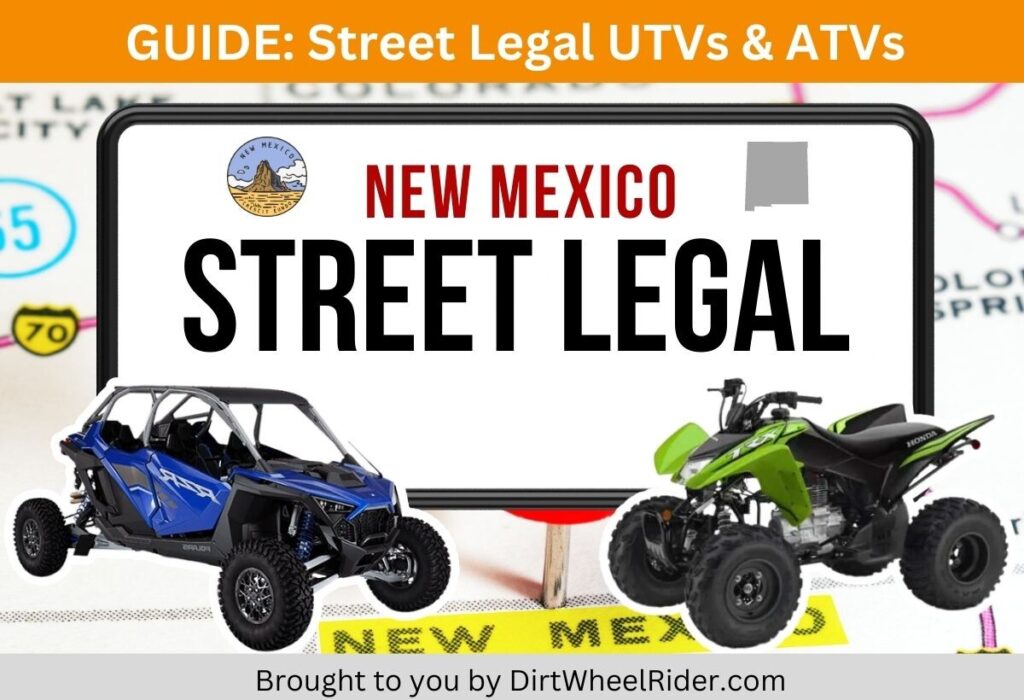
Summary:
New Mexico residents must purchase OHV registration decals from the Motor Vehicle Division (MVD). The new Paved Road decals allowing operation of UTV s and ATVs and ROVs on authorized roads.
It is illegal to operate an ATV or ROV on a paved road unless a local authority or the state transportation commission has passed an ordinance allowing such use on specific roads in specific communities. It is the responsibility of any OHV operator to know the state and local laws and rules before riding.
More details:
Understanding Street-Legal Laws for ATVs and UTVs in New Mexico
New York
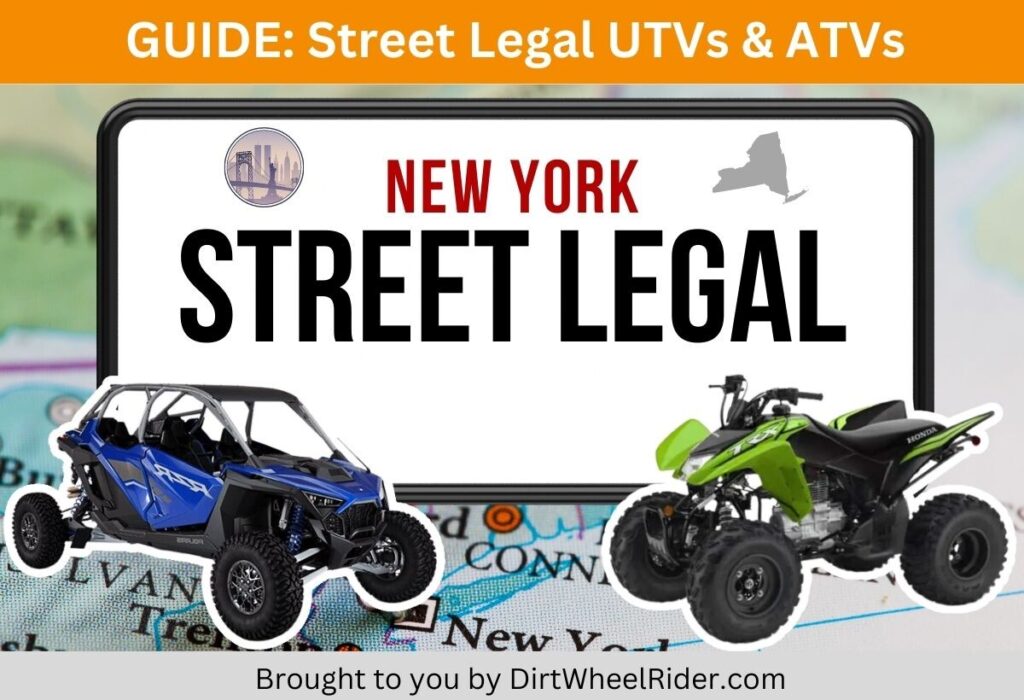
Summary:
You may not operate an ATV/ROV on a highway unless it has been designated and posted for ATV/ORV use by the state or local authority. Only the part of a highway between two off-highway trails will be posted for use. Check with local police to be sure. DMV recommends that you turn your headlight and taillight on and wear bright, reflective clothing whenever you ride on a highway. Always enter the highway with care, and yield to other traffic.
The NY DMV recommends you avoid crossing a highway unless absolutely necessary. If you cross, you must follow these rules:
- You must cross at an angle of approximately 90 degrees, at a place where there are no obstructions to prevent a quick, safe crossing.
- You must come to a complete stop and yield the right-of-way to traffic on the highway before crossing.
- You may cross a divided highway only where it intersects with another street or highway.
- You may not cross an interstate highway or any controlled-access highway, such as the Thruway or a parkway at any time.
More details:
Understanding Street-Legal Laws for ATVs and UTVs in New York
North Carolina
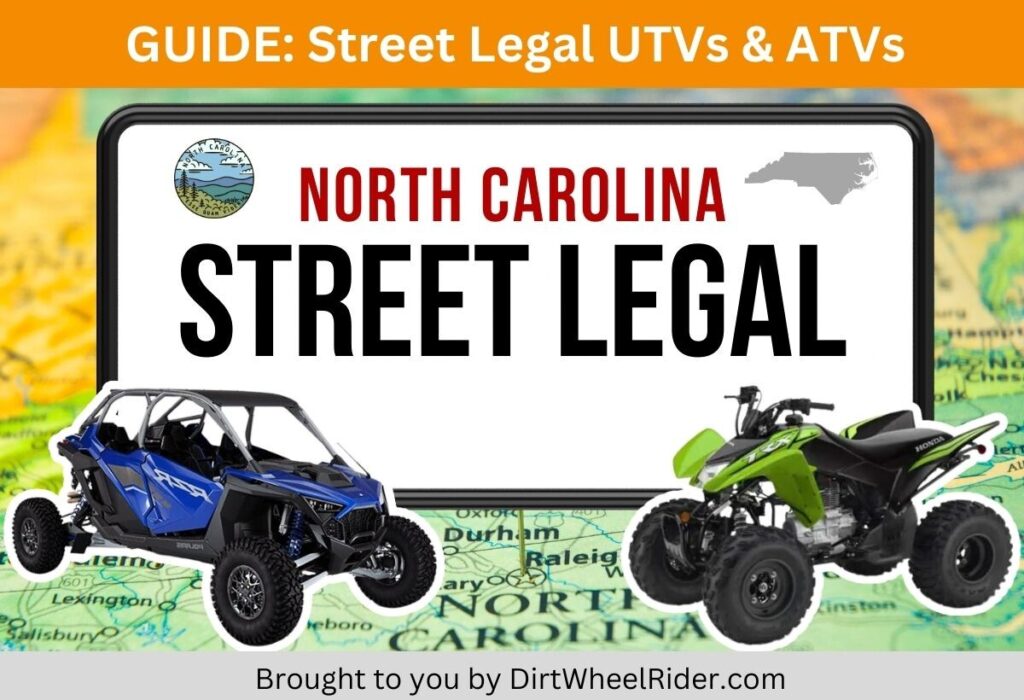
Summary:
In North Carolina, you may not operate an ATV or UTV or ATV on any interstate or highway. You may also not ride on any public street, road, or highway except for purposes of crossing that street, road, or highway. When crossing the road riders should:
- Cross at approximately 90 degrees to the road
- Come to a complete stop
- Yield to right of way traffic
- Only cross at an intersection if crossing a divided highway
More details:
Understanding Street-Legal Laws for ATVs and UTVs in North Carolina
North Dakota
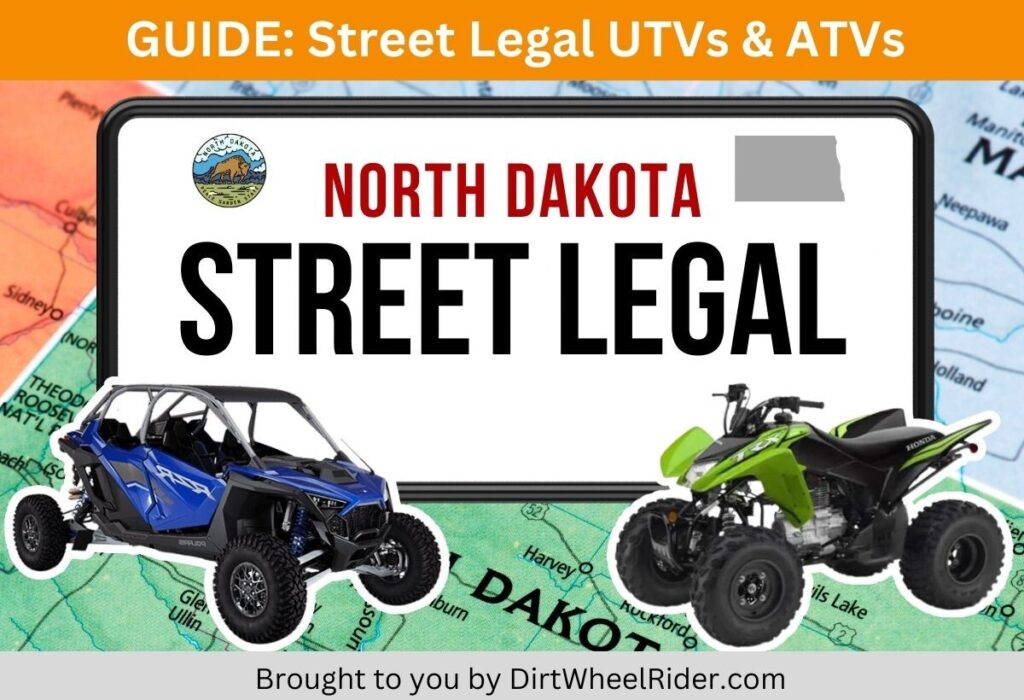
Summary:
In order to legally ride in North Dakota, all riders must be properly registered or permitted. ATVs and UTV s and ATVs can operate on:
- A paved highway posted with a speed limit not exceeding 55 miles per hour.
- A licensed driver over 16 years of age may operate a registered Class III OHV on a paved highway designated and posted at a speed not exceeding 65 miles per hour (to operate on these highways, the class III OHV must be able to attain a speed of at least 30 MPH).
- The highway right of way, the bottom of the ditch or along the outslope. It is illegal to operate on the shoulder or inside slope.
- A gravel, dirt, or loose surface roadway.
An individual can operate an OHV on a roadway (paved or loose surface) only if it is equipped with the following equipment:
- One headlamp
- One horn
- One taillight
- Speedometer/odometer
- One brake light
- One mirror
- Motor with a minimum of 350 cc
More details:
Understanding Street-Legal Laws for ATVs and UTVs in North Dakota
Ohio
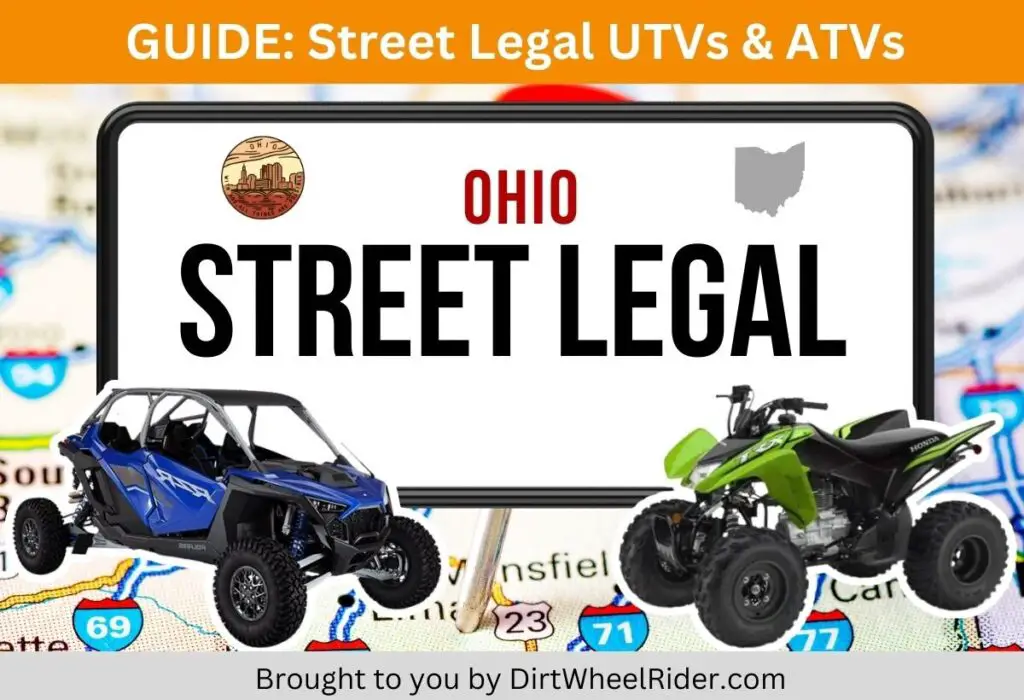
Summary:
Snowmobiles, off-highway motorcycles, and all-purpose vehicles must be registered and be licensed and may be operated as follows:
- To make a crossing of a highway whenever the crossing can be made safely and will not interfere with the movement of vehicular traffic approaching from any direction on the highway provided that the operator yields the right-of-way to any approaching traffic
- On highways in the county or township road systems whenever the local authority having jurisdiction over such highways so permits
- Off and alongside a street or highway for limited distances
- On the berm or shoulder of a highway, county, or township road
- Must have proof of financial responsibility
- Must obey all traffic regulations
More details:
Understanding Street-Legal Laws for ATVs and UTVs in Ohio
Oklahoma
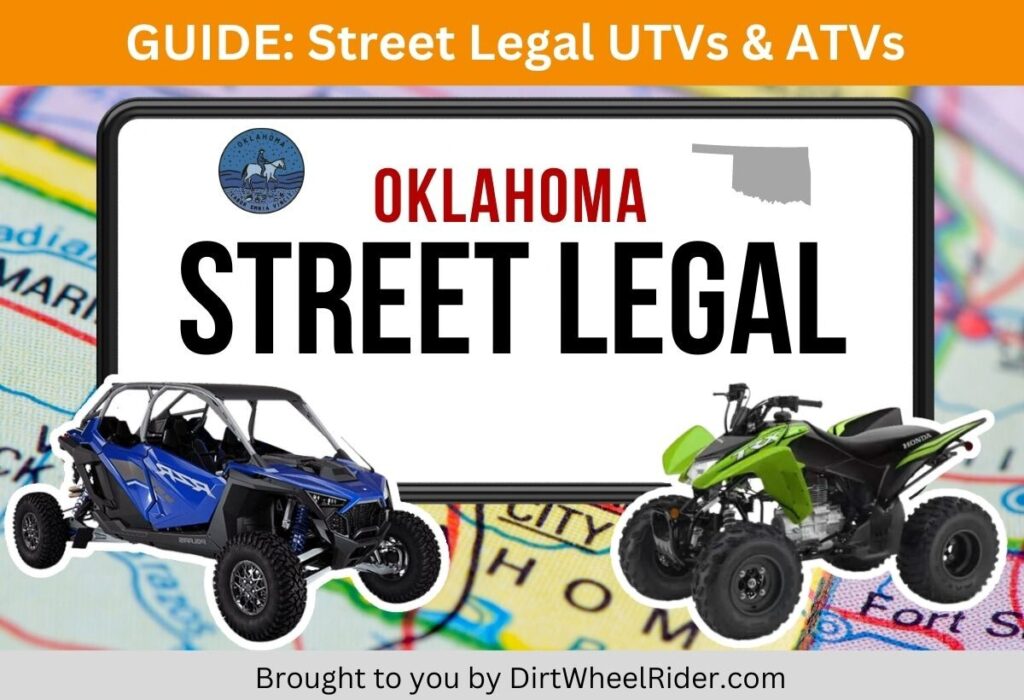
Summary:
Oklahoma requires a title and registrations and may only be used to make a direct crossing of the roadway in the following manner:
- Cross at approximately 90 degrees to the road
- Come to a complete stop
- Yield to right of way traffic
More details:
Understanding Street-Legal Laws for ATVs and UTVs in Oklahoma
Oregon
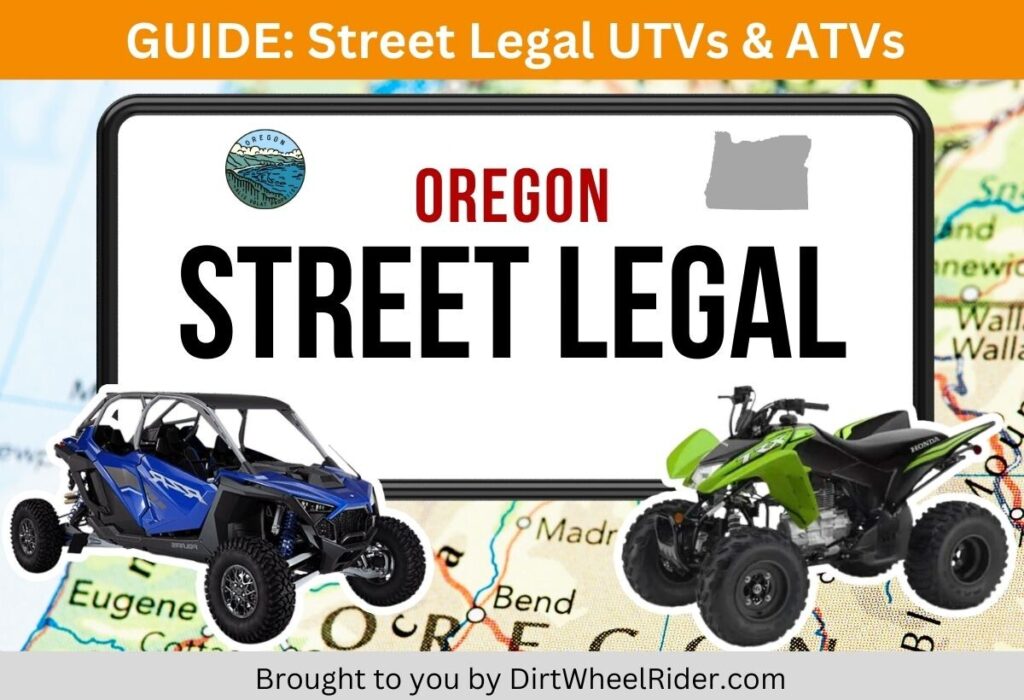
Summary:
Oregon requires UTV or ATV owners to get a permit to ride on any public land.
- Paved roads and two-lane gravel roads are generally closed to non-street legal ATVs, unless posted open
- Gravel roads, one and one-half lanes or less, are generally open to ATVs.
- On Forest Service lands, all roads are closed unless posted open
- You cannot turn at a crossroads and drive down a road closed to ATV use
- You may not operate your ATV on the shoulder of a paved road.
More details:
Understanding Street-Legal Laws for ATVs and UTVs in Oregon
Pennsylvania
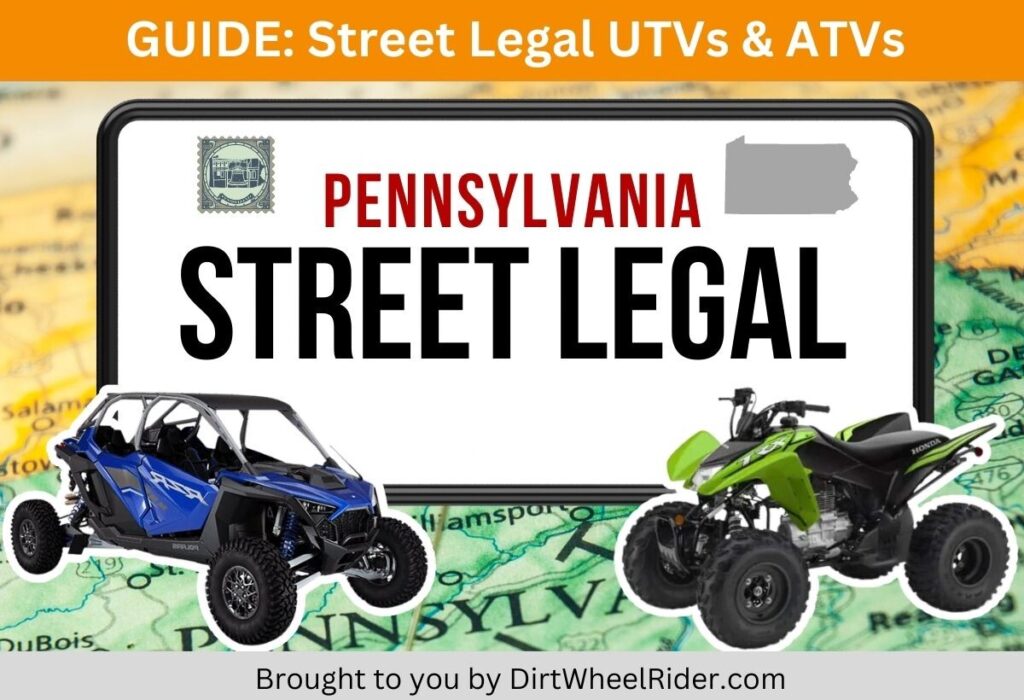
Summary:
Pennsylvania requires UTV or ATV owners to get a title and registration to operate and may not be driven on public highways or roads unless they are crossing and must:
- Cross at approximately 90 degrees to the road
- Come to a complete stop
- Yield to right of way traffic
More details:
Understanding Street-Legal Laws for ATVs and UTVs in Pennsylvania
Rhode Island
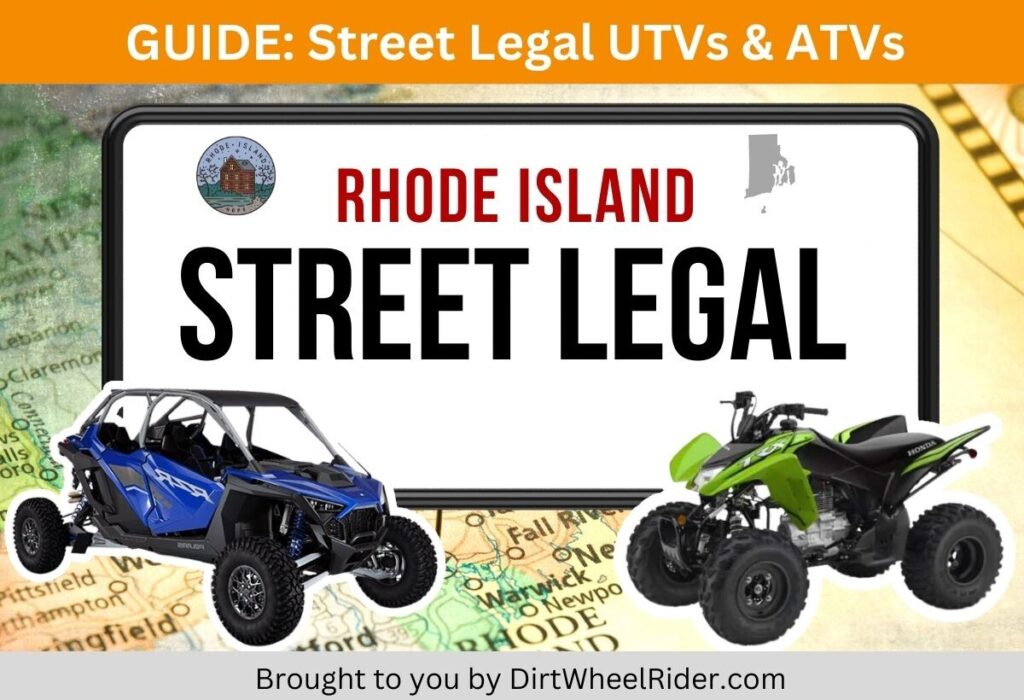
Summary:
In Rhode Island an ATV must be registered with the Director of Natural Resources for an annual fee of $10. Registration requirement violations are punishable by $100 fine. They may not be driven on public highways or roads unless they are crossing and must:
- Cross at approximately 90 degrees to the road
- Come to a complete stop
- Yield to right of way traffic
More details:
Understanding Street-Legal Laws for ATVs and UTVs in Rhode Island
South Carolina
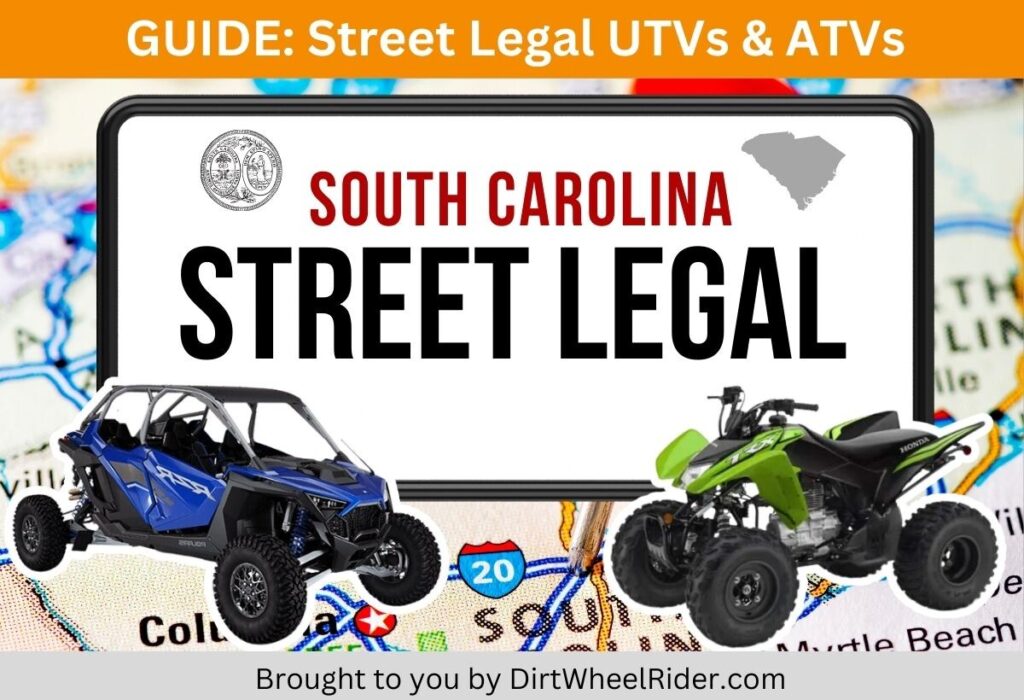
Summary:
In South Carolina UTV s and ATVs must have all of the following equipment in good working condition:
- An effective muffler system
- USDA Forest Service approved spark arrestor
- Brake system
It is not permissible to ride on highways.
More details:
Understanding Street-Legal Laws for ATVs and UTVs in South Carolina
South Dakota
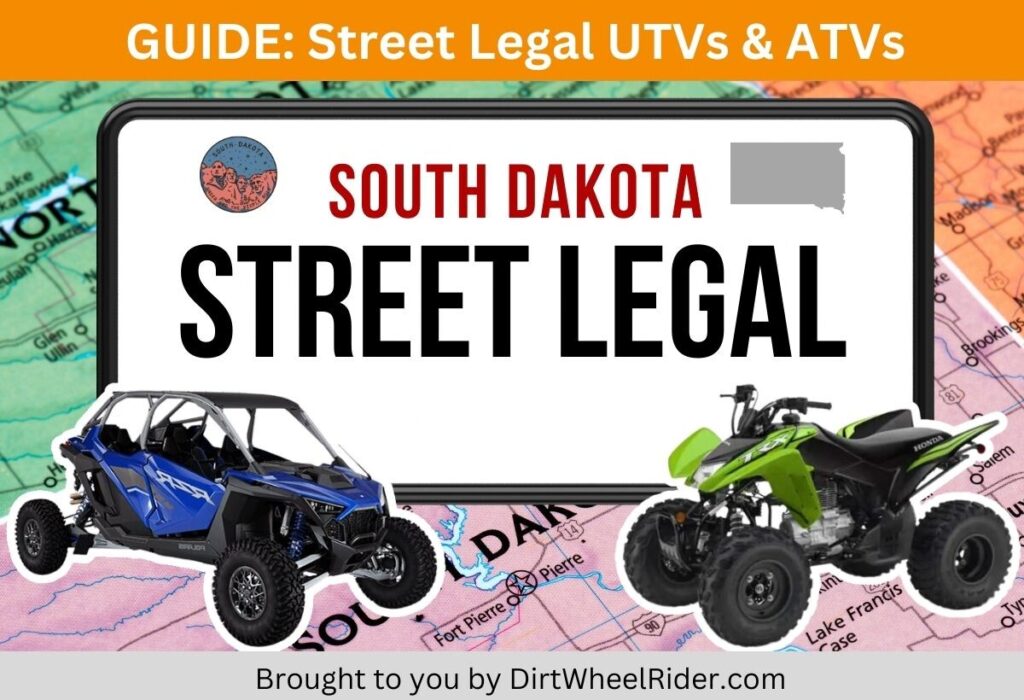
Summary:
In South Dakota, no person may operate on a public street or highway an off-road vehicle except for crossing from one side of the road to the other and may not ride in a highway ditch along the highway interstate system.
Update: ATVs and UTVs may be registered as motorcycles in South Dakota for on-highway use.
More details:
Street-Legal ATVs & UTVs in South Dakota
Tennessee
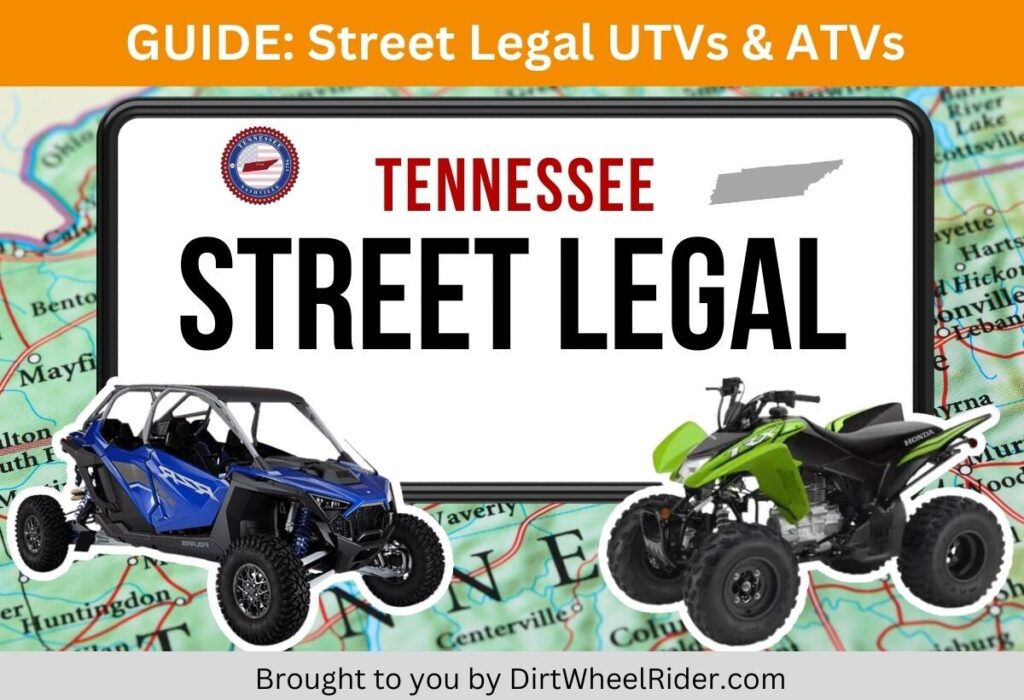
Summary:
UTV s and ATVs can not be operated on highways unless crossing from one side to another. There is no specification as to how you need to cross.
More details:
Understanding Street-Legal Laws for ATVs and UTVs in Tennessee
Texas
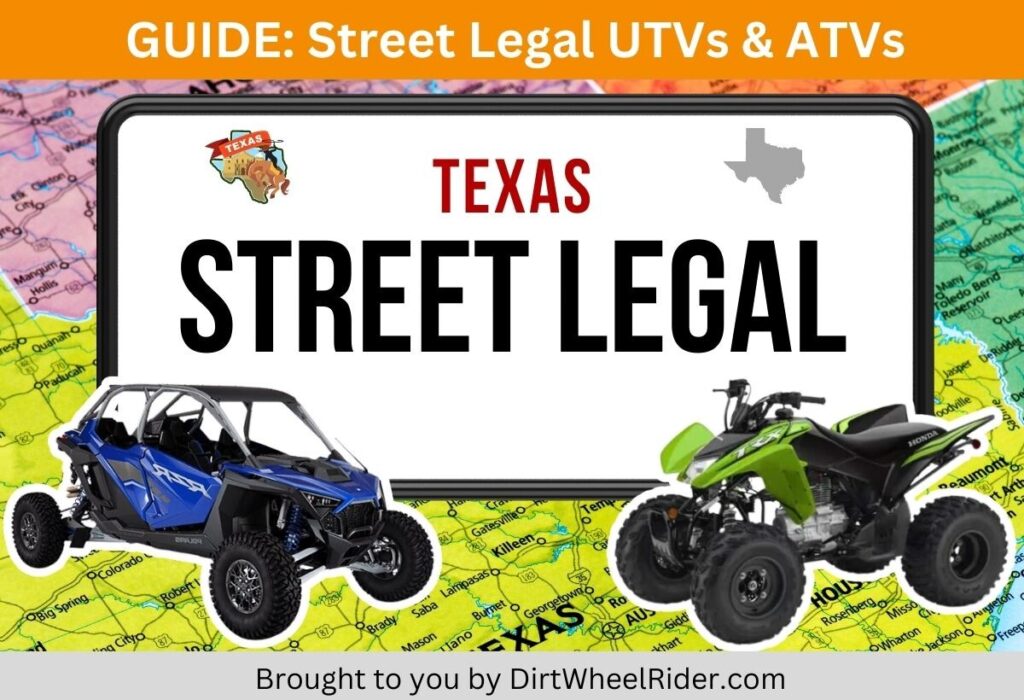
Summary:
UTVs and ATVs can’t be driven on public roads unless you are a farmer or rancher and not traveling more than 25 miles. If you drive on public roads, you have to have an orange triangle mounted to an 8-inch pole. UTVs and ATVs must have brakes, a muffler, and a headlight and taillight.
More details:
Understanding Street-Legal Laws for ATVs and UTVs in Texas
Utah
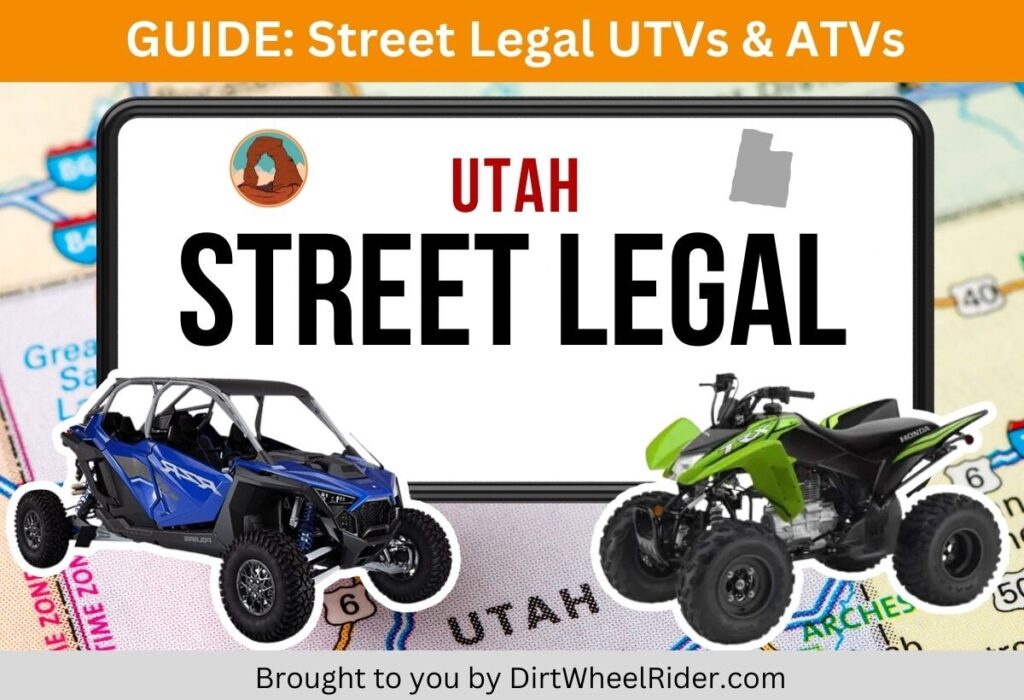
Summary:
In Utah and all-terrain type I vehicle being operated as a street-legal ATV as long as it is titled, registered, the operator has a valid driver’s license and has to be equipped with:
- One or more headlamps
- One or more tail lamps
- A tail lamp or other lamp constructed and placed to illuminate the registration plate with a white light
- One or more red reflectors on the rear
- One or more stop lamps on the rear
- Amber or red electric turn signals, one on each side of the front and rear
- A braking system, other than a parking brake
- A horn or other warning device
- A muffler and emission control system
- Rearview mirrors on the right and left side of the driver
- A windshield, unless the operator wears eye protection while operating the vehicle
- A speedometer, illuminated for nighttime operation
- For vehicles designed by the manufacturer for carrying one or more passengers, a seat designed for passengers
- Tires that:
- Are not larger than the tires that the all-terrain vehicle manufacturer made available for the all-terrain vehicle model
- Have at least 2/32 inches or greater tire tread.
More details:
Street-Legal ATVs & UTVs in Utah
Vermont
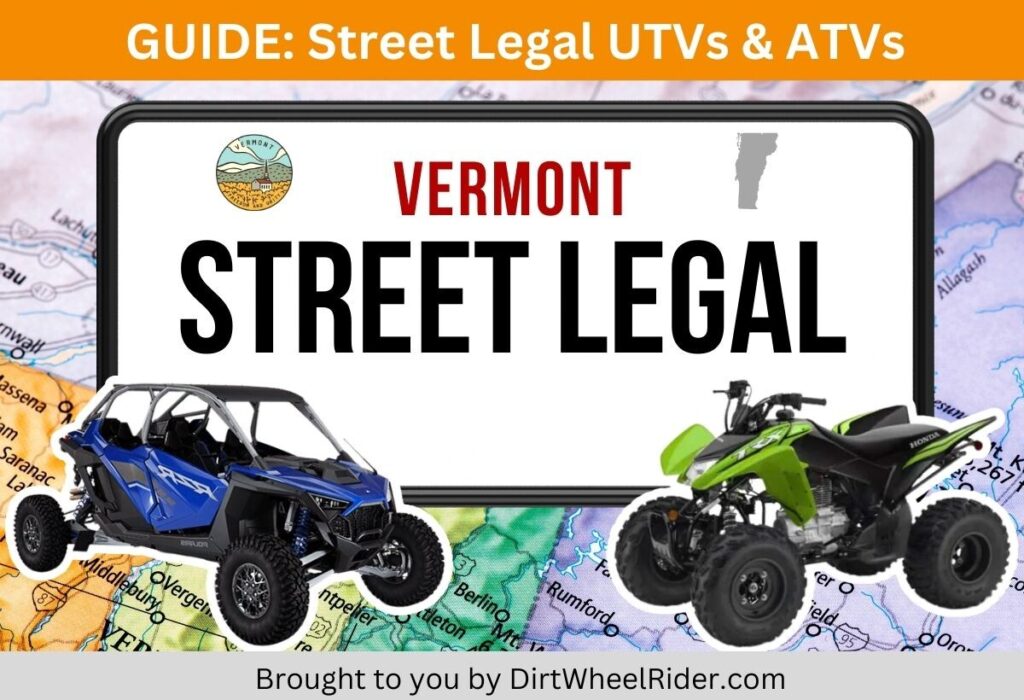
Summary:
In Vermont, UTV s and ATVs are not allowed on roads or highways except for crossing under the following terms. They must:
- Cross at approximately 90 degrees to the road
- Come to a complete stop
- Yield to right of way traffic
More details:
Understanding Street-Legal Laws for ATVs and UTVs in Vermont
Virginia
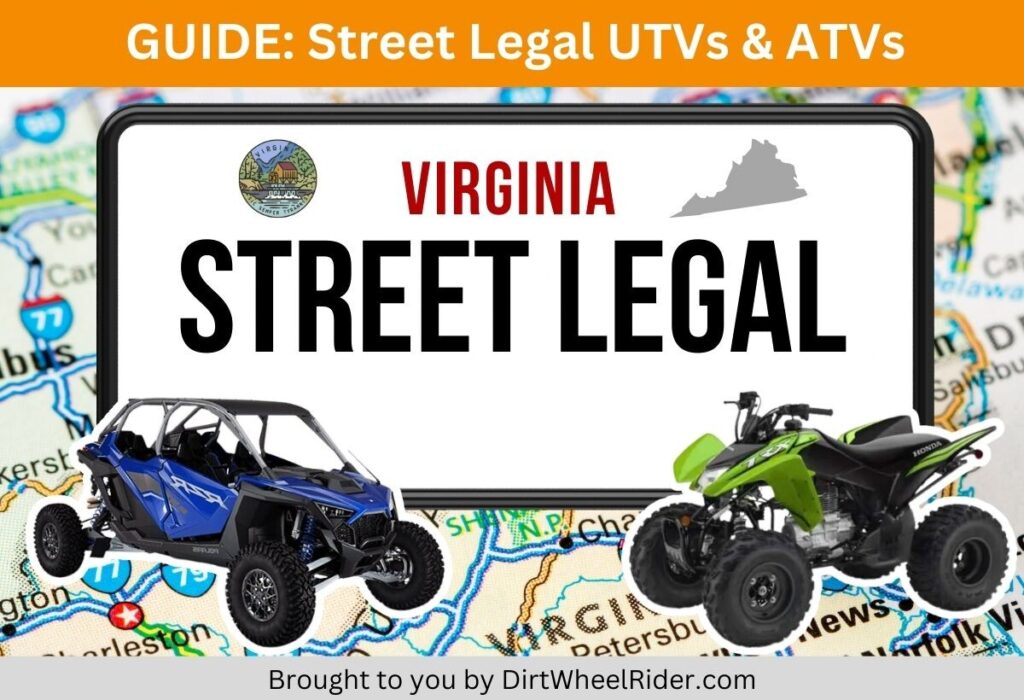
Summary:
UTVs and ATVs have to have a title and cannot be operated on the highway in Virginia except to cross public highways. There is no specification as to how you need to cross.
More details:
Can you make a UTV or ATV street legal in Virginia?
Washington
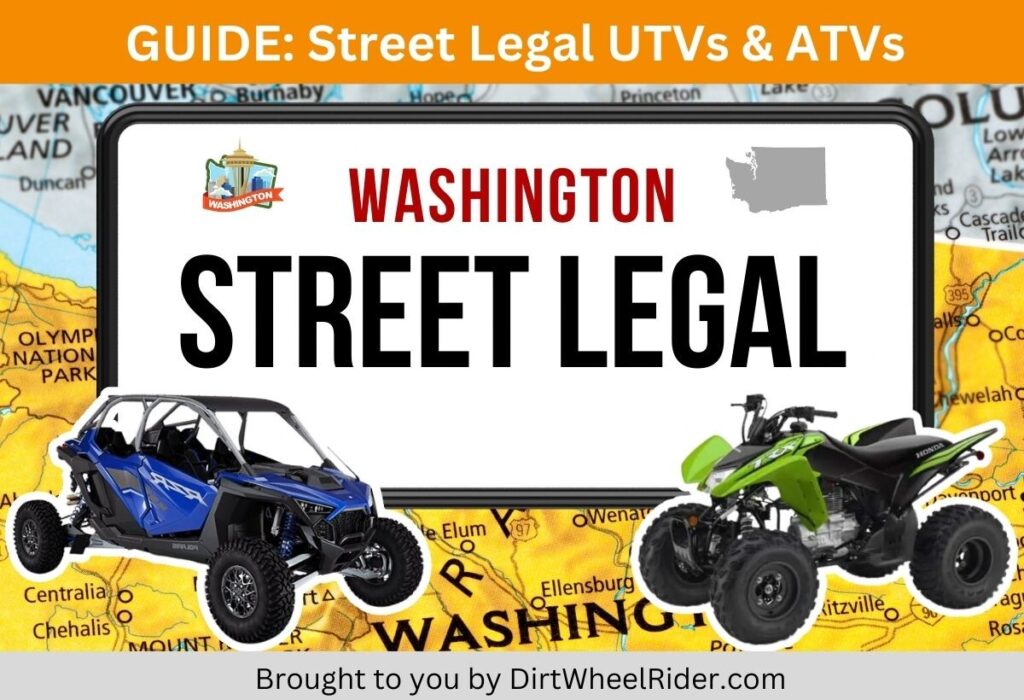
A person operating a UTV or ATV may cross a public roadway with a speed limit of sixty miles per hour or less. No specifications are given on how to cross.
More details:
Street-Legal ATVs & UTVs in Washington
West Virginia
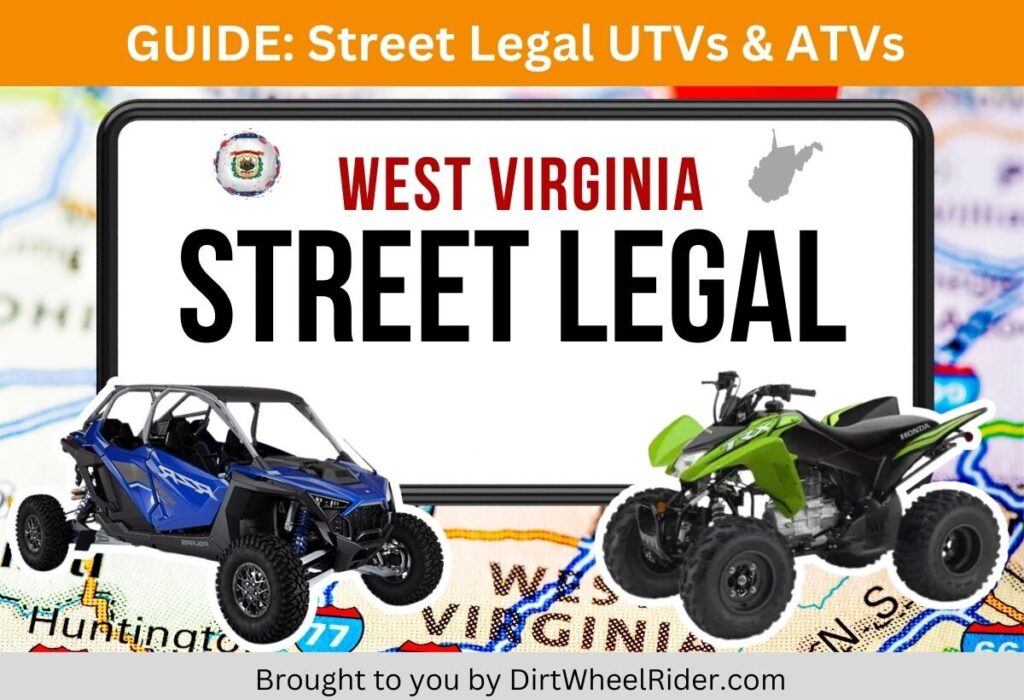
Summary:
UTVs and ATVs may not be operated in West Virginia on public roads or highways unless used to cross. They must:
- Cross at approximately 90 degrees to the road
- Come to a complete stop
- Yield to right of way traffic
- Both the headlight and taillight are illuminated when the crossing is made
More details:
Street-Legal ATVs & UTVs in West Virginia
Wisconsin
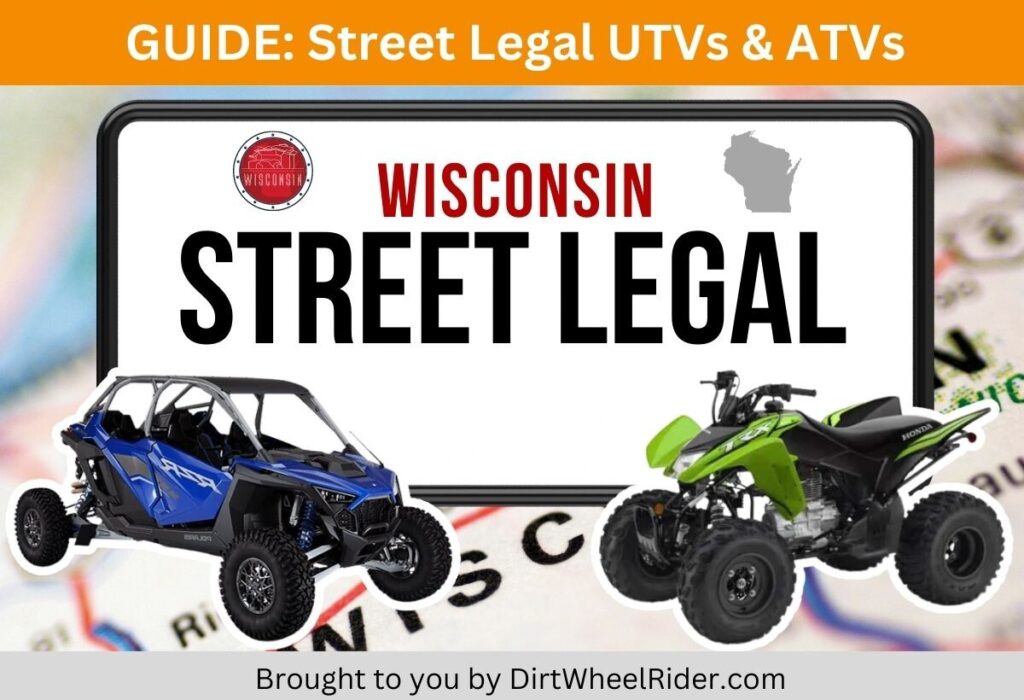
Summary:
In Wisconsin you can only operate a UTV or ATV on a public roadway if it is:
- For agricultural purposes
- On an officially designated and signed ATV Routes
- On roads not seasonally maintained for roadway use, during the time in which no maintenance occurs and the road hasn’t been closed to ATV/ UTV or ATV use
- To cross a bridge, culvert or railroad right-of-way when operating on a designated and marked UTV or ATV trail, UTV or ATV Route, or private property with permission if you:
- Determine the location is safe to cross
- Come to a complete stop
- Yield to all motor vehicles and pedestrians
- To cross a roadway while operating on a designated and marked ATV trail or private property with permission if you:
- Cross in the most direct manner possible
- Come to a complete stop.
- Yield to all motor vehicles and pedestrians
A person may operate an all-terrain vehicle or utility terrain vehicle on the roadway or shoulder of any highway to cross a bridge that is 1,000 feet in length or less if the operation is in compliance with a county ordinance that applies to that bridge and a city, village, or town ordinance that applies to that bridge.
More details:
Understanding Street-Legal Laws for ATVs and UTVs in Wisconsin
Wyoming
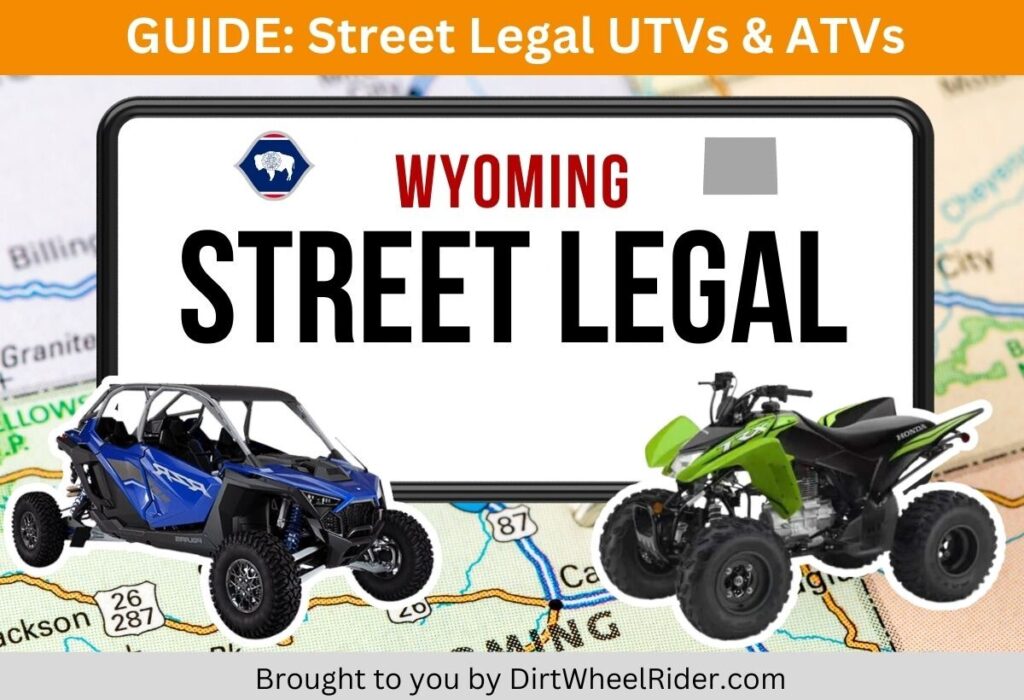
Summary:
To become street legal, you must obtain a multipurpose vehicle permit that is displayed on your UTV or ATV. With a multipurpose vehicle permit, you are able to operate your UTV or ATV on any public roads in Wyoming that are not interstates. To obtain a multipurpose vehicle permit your UTV or ATV must have a current license plate, you must have a valid driver’s license with an M or MR endorsement, and you must have proof of liability insurance, and your UTV or ATV must be equipped with the following:
- Headlamp
- Tail light
- Brake light
- Red rear reflector
- Horn
- Left hand rear view mirror
More details:
Street-Legal ATVs & UTVs in Wyoming
